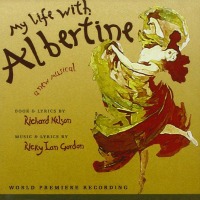 Original Off-Broadway Cast, 2003 (PS Classics)
Original Off-Broadway Cast, 2003 (PS Classics)  (3 / 5) With a book and lyrics by Richard Nelson, who also directed the show, My Life With Albertine has a powerful and distinctive score; composer Ricky Ian Gordon’s work here, ranging from near-operatic arias to comic songs, bursts with musical invention and is given a wonderful French flavor by Bruce Coughlin’s tasty orchestrations. The top-notch cast is led by Kelli O’Hara and Brent Carver. O’Hara is particularly impressive, displaying great dramatic and musical range — and she gets most of the best material. Carver’s numbers are more varied in quality, but his layered performance makes even his odder songs seem natural for his character. Although Chad Kimball doesn’t quite reach his co-stars’ level of achievement, the overqualified members of the ensemble — including Emily Skinner, Donna Lynne Champlin, and Brooke Sunny Moriber — sound pretty much perfect throughout. — Matthew Murray
(3 / 5) With a book and lyrics by Richard Nelson, who also directed the show, My Life With Albertine has a powerful and distinctive score; composer Ricky Ian Gordon’s work here, ranging from near-operatic arias to comic songs, bursts with musical invention and is given a wonderful French flavor by Bruce Coughlin’s tasty orchestrations. The top-notch cast is led by Kelli O’Hara and Brent Carver. O’Hara is particularly impressive, displaying great dramatic and musical range — and she gets most of the best material. Carver’s numbers are more varied in quality, but his layered performance makes even his odder songs seem natural for his character. Although Chad Kimball doesn’t quite reach his co-stars’ level of achievement, the overqualified members of the ensemble — including Emily Skinner, Donna Lynne Champlin, and Brooke Sunny Moriber — sound pretty much perfect throughout. — Matthew Murray
All posts by Michael Portantiere
My Favorite Year
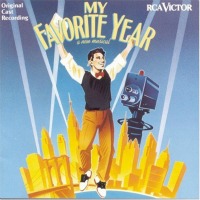 Original Broadway Cast, 1992 (RCA)
Original Broadway Cast, 1992 (RCA)  (3 / 5) No two Stephen Flaherty-Lynn Ahrens scores sound remotely alike. Here, the flavor is bright, clever, and wonderfully varied. In adapting the popular film My Favorite Year to the musical stage, the team did first-rate work, from the dynamite opening number “Twenty Million People” to the hilarious and touching “Funny” to the warm “Shut Up and Dance.” Michael Starobin’s orchestrations reflect the show’s setting with just the right 1960s New York brassiness, and Ted Sperling conducts with great verve. Would that the cast were so consistently strong. Yes, Andrea Martin lands every joke, and Tim Curry’s self-loathing Alan Swann (read: Errol Flynn) comes through vividly on disc. But Lainie Kazan’s Jewish mama is over the top, Tom Mardirosian’s King Kaiser (read: Sid Caesar) should be side-splitting but is merely unpleasant, and leading man Evan Pappas tries too hard to be liked; his relentless niceness nearly kills the affecting “Larger Than Life.” Still, this recording shows off the work of two supremely gifted songwriters. — Marc Miller
(3 / 5) No two Stephen Flaherty-Lynn Ahrens scores sound remotely alike. Here, the flavor is bright, clever, and wonderfully varied. In adapting the popular film My Favorite Year to the musical stage, the team did first-rate work, from the dynamite opening number “Twenty Million People” to the hilarious and touching “Funny” to the warm “Shut Up and Dance.” Michael Starobin’s orchestrations reflect the show’s setting with just the right 1960s New York brassiness, and Ted Sperling conducts with great verve. Would that the cast were so consistently strong. Yes, Andrea Martin lands every joke, and Tim Curry’s self-loathing Alan Swann (read: Errol Flynn) comes through vividly on disc. But Lainie Kazan’s Jewish mama is over the top, Tom Mardirosian’s King Kaiser (read: Sid Caesar) should be side-splitting but is merely unpleasant, and leading man Evan Pappas tries too hard to be liked; his relentless niceness nearly kills the affecting “Larger Than Life.” Still, this recording shows off the work of two supremely gifted songwriters. — Marc Miller
My Fair Lady
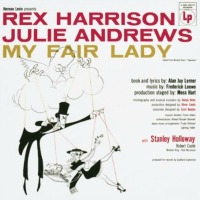 Original Broadway Cast, 1956 (Columbia/Sony)
Original Broadway Cast, 1956 (Columbia/Sony)  (5 / 5) My Fair Lady is still regarded by many as the supreme achievement of the American musical theater, and the original performances of Rex Harrison as Henry Higgins, Julie Andrews as Eliza Doolittle, Stanley Holloway as Alfred P. Doolittle, and Robert Coote as Colonel Pickering are considered definitive. Overall, lyricist-librettist Alan Jay Lerner and composer Frederick Loewe did such a masterful job in adapting George Bernard Shaw’s Pygmalion to the musical stage that critics have been happy to forgive the several grammatical errors in Lerner’s lyrics, as well as his use of some words and expressions that are not employed in British English. The show was the biggest hit of its era, and you can hear the excitement of everyone involved on the cast album, recorded in the flush of great success. Harrison has the time of his life as Higgins; his obvious enjoyment of the role makes an overbearing character tremendously entertaining. The young Andrews is a dream Eliza, equally effective as the squawking guttersnipe and the grand lady with pear-shaped tones. Her best moments on the album are “I Could Have Danced All Night” and “Show Me,” but she’s loverly throughout. Holloway, in the role of Eliza’s father, is a charming rogue as he leads the ensemble in “With a Little Bit of Luck” and “Get Me to the Church on Time.” Coote is wonderfully droll as Pickering, and the rich-voiced John Michael King does a fine job with Freddy Eynsford-Hill’s “On the Street Where You Live.” Franz Allers conducts the score with great skill and energy. (The fabulous orchestrations are by Robert Russell Bennett and Philip J. Lang.) As performed and recorded here, “The Rain in Spain” is an electrifying moment of joyful triumph, and if the first few measures of the brilliant overture don’t start your pulse racing, you’ve probably already shuffled off this mortal coil. Whatever its minor flaws, this recording is stunningly well done, and should be a cornerstone of every cast album collection. — Michael Portantiere
(5 / 5) My Fair Lady is still regarded by many as the supreme achievement of the American musical theater, and the original performances of Rex Harrison as Henry Higgins, Julie Andrews as Eliza Doolittle, Stanley Holloway as Alfred P. Doolittle, and Robert Coote as Colonel Pickering are considered definitive. Overall, lyricist-librettist Alan Jay Lerner and composer Frederick Loewe did such a masterful job in adapting George Bernard Shaw’s Pygmalion to the musical stage that critics have been happy to forgive the several grammatical errors in Lerner’s lyrics, as well as his use of some words and expressions that are not employed in British English. The show was the biggest hit of its era, and you can hear the excitement of everyone involved on the cast album, recorded in the flush of great success. Harrison has the time of his life as Higgins; his obvious enjoyment of the role makes an overbearing character tremendously entertaining. The young Andrews is a dream Eliza, equally effective as the squawking guttersnipe and the grand lady with pear-shaped tones. Her best moments on the album are “I Could Have Danced All Night” and “Show Me,” but she’s loverly throughout. Holloway, in the role of Eliza’s father, is a charming rogue as he leads the ensemble in “With a Little Bit of Luck” and “Get Me to the Church on Time.” Coote is wonderfully droll as Pickering, and the rich-voiced John Michael King does a fine job with Freddy Eynsford-Hill’s “On the Street Where You Live.” Franz Allers conducts the score with great skill and energy. (The fabulous orchestrations are by Robert Russell Bennett and Philip J. Lang.) As performed and recorded here, “The Rain in Spain” is an electrifying moment of joyful triumph, and if the first few measures of the brilliant overture don’t start your pulse racing, you’ve probably already shuffled off this mortal coil. Whatever its minor flaws, this recording is stunningly well done, and should be a cornerstone of every cast album collection. — Michael Portantiere
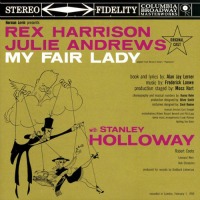 Original London Cast, 1959 (Columbia/Sony)
Original London Cast, 1959 (Columbia/Sony)  (2 / 5) The peerless original Broadway cast album of My Fair Lady was recorded just a few months before stereo was established as the industry norm. Since the four leads of the Broadway production repeated their roles in London, the powers that were at Columbia Records decided that a new cast album in true stereo would be highly marketable. Alas, the London recording turned out to be a disappointment. As Higgins, Rex Harrison here indulges in quite a bit of overacting. Julie Andrews, who was reportedly ill for the recording sessions, sounds rather tired and droopy — although, on the plus side, her delivery of Eliza’s Cockney accent here is more natural than on the prior album, which helps make for a more satisfying performance of “Wouldn’t it Be Loverly?” in particular. This time out, both Andrews and Stanley Holloway do an awful lot of talk-singing, giving Harrison a run for his money in that respect. Robert Coote rushes “You Did It,” which is surprising, since conductor Cyril Ornadel’s conducting of this and some of the other songs is very brisk to begin with (and quite sloppy in a few sections). In Freddy’s “On the Street Where You Live,” Leonard Weir sounds a little thin and under-powered in his lower register, even though the key of the song has been raised, but his voice blooms on the high notes, and his accent is more authentically British than his Broadway predecessor. (The latter can also be said of the members of the singing ensemble, which of course is not surprising under the circumstances.) Ironically, the sound quality of this recording is inferior to that of the original; yes, the London album is stereophonic, but there’s significant distortion in certain tracks, most severely in the overture, and the general timbre of the sound lacks the warmth of the monophonic original. A fascinating anomaly of the album is that it reflects some rewrites done by Lerner because he only belatedly realized (or was informed) that several words, phrases, and expressions he had used in his lyrics are not employed in British English. So, for example, in “Get Me to The Church on Time,” the phrase “stamp me and mail me” was changed to “bond me and bail me” (as the Brits say “post” rather than “mail”), and in “Show Me,” Eliza here sings “Please don’t implore, beg or beseech, don’t make a speech” rather than “Don’t talk of June, don’t talk of fall, don’t talk at all” (as the Brits say “autumn,” never “fall.”) Note: The CD/digital issue of this album includes as a bonus track Percy Faith’s recording of the beautiful “Embassy Waltz,” which had not been recorded for either the original Broadway or the London cast album. — M.P.
(2 / 5) The peerless original Broadway cast album of My Fair Lady was recorded just a few months before stereo was established as the industry norm. Since the four leads of the Broadway production repeated their roles in London, the powers that were at Columbia Records decided that a new cast album in true stereo would be highly marketable. Alas, the London recording turned out to be a disappointment. As Higgins, Rex Harrison here indulges in quite a bit of overacting. Julie Andrews, who was reportedly ill for the recording sessions, sounds rather tired and droopy — although, on the plus side, her delivery of Eliza’s Cockney accent here is more natural than on the prior album, which helps make for a more satisfying performance of “Wouldn’t it Be Loverly?” in particular. This time out, both Andrews and Stanley Holloway do an awful lot of talk-singing, giving Harrison a run for his money in that respect. Robert Coote rushes “You Did It,” which is surprising, since conductor Cyril Ornadel’s conducting of this and some of the other songs is very brisk to begin with (and quite sloppy in a few sections). In Freddy’s “On the Street Where You Live,” Leonard Weir sounds a little thin and under-powered in his lower register, even though the key of the song has been raised, but his voice blooms on the high notes, and his accent is more authentically British than his Broadway predecessor. (The latter can also be said of the members of the singing ensemble, which of course is not surprising under the circumstances.) Ironically, the sound quality of this recording is inferior to that of the original; yes, the London album is stereophonic, but there’s significant distortion in certain tracks, most severely in the overture, and the general timbre of the sound lacks the warmth of the monophonic original. A fascinating anomaly of the album is that it reflects some rewrites done by Lerner because he only belatedly realized (or was informed) that several words, phrases, and expressions he had used in his lyrics are not employed in British English. So, for example, in “Get Me to The Church on Time,” the phrase “stamp me and mail me” was changed to “bond me and bail me” (as the Brits say “post” rather than “mail”), and in “Show Me,” Eliza here sings “Please don’t implore, beg or beseech, don’t make a speech” rather than “Don’t talk of June, don’t talk of fall, don’t talk at all” (as the Brits say “autumn,” never “fall.”) Note: The CD/digital issue of this album includes as a bonus track Percy Faith’s recording of the beautiful “Embassy Waltz,” which had not been recorded for either the original Broadway or the London cast album. — M.P.
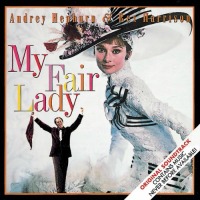 Film Soundtrack, 1964 (Columbia/Sony)
Film Soundtrack, 1964 (Columbia/Sony)  (3 / 5) This recording boasts fabulous orchestrations by Alexander Courage, Robert Franklyn, and Al Woodbury, created under the supervision of conductor André Previn. The orchestrations are lush without ever seeming gimmicky or overblown. Rex Harrison’s Henry Higgins actually sounds fresher here than on the London cast recording; it would seem that a break from the role benefited his performance. As for Eliza Doolittle, the initial plan was to try to use Audrey Hepburn’s singing voice as much as possible, so she recorded several of the songs transposed to the keys in which she was most comfortable. But even after it was decided that “Ghostess with the Mostes'” Marni Nixon would dub almost all of Hepburn’s singing (except for the first and last sections of “Just You Wait” and two lines at the beginning of “I Could Have Danced All Night”), the Hepburn keys were retained. As a result, Nixon’s performance was compromised, and Eliza’s songs come across only moderately well on this recording. But Stanley Holloway, back again as Alfie Doolittle, is perfect as ever; Wilfrid Hyde-White is an ingratiating Pickering; and vocal ghost Bill Shirley persuasively sings “On the Street Where You Live” on behalf of actor Jeremy Brett’s Freddy, even if their voices seem quite a poor match when you hear the switch from dialogue to song while watching the film. The CD is a much-expanded version of the original LP. Extras include a lovely orchestral version of “Wouldn’t It Be Loverly?” for the flower market scene preceding “With a Little Bit of Luck,” the servants’ chorus lead-in to “The Rain in Spain,” the intermission and exit music, and best of all, the gorgeous “Embassy Waltz.” Interestingly, all of the song lyrics as heard in the film are the original versions, complete with the inauthentic American rather than British phrasing noted in the review of the London cast album above. — M.P.
(3 / 5) This recording boasts fabulous orchestrations by Alexander Courage, Robert Franklyn, and Al Woodbury, created under the supervision of conductor André Previn. The orchestrations are lush without ever seeming gimmicky or overblown. Rex Harrison’s Henry Higgins actually sounds fresher here than on the London cast recording; it would seem that a break from the role benefited his performance. As for Eliza Doolittle, the initial plan was to try to use Audrey Hepburn’s singing voice as much as possible, so she recorded several of the songs transposed to the keys in which she was most comfortable. But even after it was decided that “Ghostess with the Mostes'” Marni Nixon would dub almost all of Hepburn’s singing (except for the first and last sections of “Just You Wait” and two lines at the beginning of “I Could Have Danced All Night”), the Hepburn keys were retained. As a result, Nixon’s performance was compromised, and Eliza’s songs come across only moderately well on this recording. But Stanley Holloway, back again as Alfie Doolittle, is perfect as ever; Wilfrid Hyde-White is an ingratiating Pickering; and vocal ghost Bill Shirley persuasively sings “On the Street Where You Live” on behalf of actor Jeremy Brett’s Freddy, even if their voices seem quite a poor match when you hear the switch from dialogue to song while watching the film. The CD is a much-expanded version of the original LP. Extras include a lovely orchestral version of “Wouldn’t It Be Loverly?” for the flower market scene preceding “With a Little Bit of Luck,” the servants’ chorus lead-in to “The Rain in Spain,” the intermission and exit music, and best of all, the gorgeous “Embassy Waltz.” Interestingly, all of the song lyrics as heard in the film are the original versions, complete with the inauthentic American rather than British phrasing noted in the review of the London cast album above. — M.P.
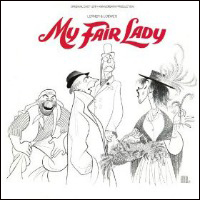 Broadway Cast, 1976 (Columbia/Masterworks Broadway)
Broadway Cast, 1976 (Columbia/Masterworks Broadway) (4.5 / 5) The CD edition of this cast album of the 20th anniversary Broadway revival of My Fair Lady was issued belatedly but was very welcome when it did appear, as the recording is excellent overall. Ian Richardson is a witty and mercurial Higgins, though some listeners may feel he does a bit too much shouting. Christine Andreas is a superb, golden-voiced Eliza, singing some of the character’s songs in higher keys than Julie Andrews did for the OBCR, with perfect cockney and then RP accents. George Rose has a marvelous, rousing time as Alfie P. Doolittle; he won a Tony Award for his performance, in the Best Actor rather than Featured Actor category. It’s great to have the wonderfully funny and authentic Robert Coote back as Colonel Pickering. And Jerry Lanning is the most vocally resplendent Freddy on record, so much so that when he sings “On the Street Where You Live,” you almost expect Eliza to throw herself right into his arms. The sound quality of the recording is somewhat dry, but sharp and clear. And it sure is a lovely bonus that the album cover features a new sketch by the legendary Al Hirschfeld, a treasurable companion piece to his iconic work for the original production. — M.P.
(4.5 / 5) The CD edition of this cast album of the 20th anniversary Broadway revival of My Fair Lady was issued belatedly but was very welcome when it did appear, as the recording is excellent overall. Ian Richardson is a witty and mercurial Higgins, though some listeners may feel he does a bit too much shouting. Christine Andreas is a superb, golden-voiced Eliza, singing some of the character’s songs in higher keys than Julie Andrews did for the OBCR, with perfect cockney and then RP accents. George Rose has a marvelous, rousing time as Alfie P. Doolittle; he won a Tony Award for his performance, in the Best Actor rather than Featured Actor category. It’s great to have the wonderfully funny and authentic Robert Coote back as Colonel Pickering. And Jerry Lanning is the most vocally resplendent Freddy on record, so much so that when he sings “On the Street Where You Live,” you almost expect Eliza to throw herself right into his arms. The sound quality of the recording is somewhat dry, but sharp and clear. And it sure is a lovely bonus that the album cover features a new sketch by the legendary Al Hirschfeld, a treasurable companion piece to his iconic work for the original production. — M.P.
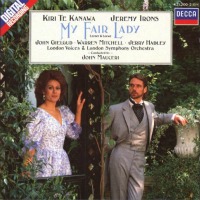 Studio Cast, 1987 (London)
Studio Cast, 1987 (London)  (3 / 5) As Eliza Doolittle, the Maori operatic soprano Kiri Te Kanawa affects a convincing Cockney accent, and her voice blooms in the higher reaches of the score. Still, there’s a studied quality to her performance, and she sounds a bit too mature for the role — more grande dame than young girl, especially after Eliza’s transformation into a lady with perfect speech. Also, the keys of some of Eliza’s songs have been raised for Te Kanawa, and this is sometimes counterproductive, as in “Show Me.” Jeremy Irons is quite fine as Higgins, although he perhaps overdoes the petulance and anger of the character, and he sings rather than speaks more of Higgins’ songs than is desirable. Conversely, Sir John Gielgud talks his way nearly throughout “You Did It,” and he sounds ancient. On the plus side, opera tenor Jerry Hadley’s voice is well suited for “On the Street Where You Live,” and Warren Mitchell is a colorful Alfie Doolittle. The Brit dialect accents called for in the various choral numbers, whether RP in “The Ascot Gavotte” or Cockney in “With a Little Bit of Luck” and “Get Me to the Church on Time,” are accurately rendered by The London Voices. The London Symphony Orchestra is ably led by John Mauceri, and more of the brilliant My Fair Lady score is included here than in any previous recording. — M.P.
(3 / 5) As Eliza Doolittle, the Maori operatic soprano Kiri Te Kanawa affects a convincing Cockney accent, and her voice blooms in the higher reaches of the score. Still, there’s a studied quality to her performance, and she sounds a bit too mature for the role — more grande dame than young girl, especially after Eliza’s transformation into a lady with perfect speech. Also, the keys of some of Eliza’s songs have been raised for Te Kanawa, and this is sometimes counterproductive, as in “Show Me.” Jeremy Irons is quite fine as Higgins, although he perhaps overdoes the petulance and anger of the character, and he sings rather than speaks more of Higgins’ songs than is desirable. Conversely, Sir John Gielgud talks his way nearly throughout “You Did It,” and he sounds ancient. On the plus side, opera tenor Jerry Hadley’s voice is well suited for “On the Street Where You Live,” and Warren Mitchell is a colorful Alfie Doolittle. The Brit dialect accents called for in the various choral numbers, whether RP in “The Ascot Gavotte” or Cockney in “With a Little Bit of Luck” and “Get Me to the Church on Time,” are accurately rendered by The London Voices. The London Symphony Orchestra is ably led by John Mauceri, and more of the brilliant My Fair Lady score is included here than in any previous recording. — M.P.
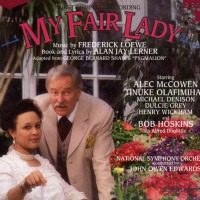 Studio Cast, 1993-94 (JAY, 2CDs)
Studio Cast, 1993-94 (JAY, 2CDs)  (3 / 5) Here is the first note-complete aural document of the My Fair Lady score. In this case, completeness is particularly important for the dance music, largely omitted on other recordings but included here. Other pluses: Alec McCowan is a delightful Higgins, and Tinuke Olafimihan is an excellent Eliza, fully credible in the Cockney numbers and singing “I Could Have Danced All Night” gloriously. As Freddy, Henry Wickham performs “On the Street Where You Live” with sincerity, although his voice is rather shaky. Michael Denison is serviceable as Pickering, even if he makes little attempt to match pitches in “You Did It.” But Bob Hoskins, a fine actor, simply doesn’t have enough voice for Alfred P. Doolittle’s songs; he sounds very raspy throughout, and his lower register is basically non-existent. The National Symphony Orchestra, recorded in state-of-the-art sound, plays beautifully in some sections but sloppily in others under John Owens Edwards; for example, there’s a flubbed entrance at the top of the overture that really should have prompted a retake. — M.P.
(3 / 5) Here is the first note-complete aural document of the My Fair Lady score. In this case, completeness is particularly important for the dance music, largely omitted on other recordings but included here. Other pluses: Alec McCowan is a delightful Higgins, and Tinuke Olafimihan is an excellent Eliza, fully credible in the Cockney numbers and singing “I Could Have Danced All Night” gloriously. As Freddy, Henry Wickham performs “On the Street Where You Live” with sincerity, although his voice is rather shaky. Michael Denison is serviceable as Pickering, even if he makes little attempt to match pitches in “You Did It.” But Bob Hoskins, a fine actor, simply doesn’t have enough voice for Alfred P. Doolittle’s songs; he sounds very raspy throughout, and his lower register is basically non-existent. The National Symphony Orchestra, recorded in state-of-the-art sound, plays beautifully in some sections but sloppily in others under John Owens Edwards; for example, there’s a flubbed entrance at the top of the overture that really should have prompted a retake. — M.P.
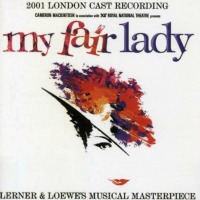 London Cast, 2001 (First Night) No stars; not recommended. As soon as you hear this cast album begin without the pulse-quickening music that began every previous production and recording of My Fair Lady, you’ll sense that you’re in for a deeply disappointing experience. Aside from fussy rearrangements/re-orchestrations by the normally reliable William David Brohn, the performance suffers from some very weak casting. As Eliza, Martine McCutcheon displays an exceedingly thin voice, and Mark Umbers’ rendition of Freddy’s “On the Street Where You Live” is full of superficial, heavy-handed effects but lacks real emotion. On the credit side, Jonathan Pryce offers an intelligent characterization of Henry Higgins, deftly walking the line between singing and speaking, and his imitation of Zoltan Karpathy’s Hungarian accent in “You Did It” is genuinely funny. As Pickering, Nicholas Le Prevost is also fine, and his byplay with Pryce is delightful. But it’s difficult to enjoy these worthy performances, given the setting. This recording is sadly indicative of the destructive influence that producer Cameron Mackintosh has had on musical theater, both in terms of his productions of poorly written new shows and his ill-conceived revivals of classics. — M.P.
London Cast, 2001 (First Night) No stars; not recommended. As soon as you hear this cast album begin without the pulse-quickening music that began every previous production and recording of My Fair Lady, you’ll sense that you’re in for a deeply disappointing experience. Aside from fussy rearrangements/re-orchestrations by the normally reliable William David Brohn, the performance suffers from some very weak casting. As Eliza, Martine McCutcheon displays an exceedingly thin voice, and Mark Umbers’ rendition of Freddy’s “On the Street Where You Live” is full of superficial, heavy-handed effects but lacks real emotion. On the credit side, Jonathan Pryce offers an intelligent characterization of Henry Higgins, deftly walking the line between singing and speaking, and his imitation of Zoltan Karpathy’s Hungarian accent in “You Did It” is genuinely funny. As Pickering, Nicholas Le Prevost is also fine, and his byplay with Pryce is delightful. But it’s difficult to enjoy these worthy performances, given the setting. This recording is sadly indicative of the destructive influence that producer Cameron Mackintosh has had on musical theater, both in terms of his productions of poorly written new shows and his ill-conceived revivals of classics. — M.P.
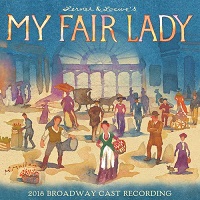 Broadway Cast, 2018 (Broadway Records)
Broadway Cast, 2018 (Broadway Records)  (4 / 5) Here’s the most satisfying — or, to put it another way, the least problematic — cast recording of My Fair Lady in many years. Lauren Ambrose made a largely well-received musical theater debut as Eliza in this Lincoln Center Theater production, her performance marred only by some odd physical mannerisms and a tendency to lag behind the beat throughout her songs. That first issue obviously doesn’t mar the album, and the second one seems to have been addressed during the recording sessions, so Ambrose’s performance here is quite enjoyable overall. Harry Hadden-Paton brings a refreshingly youthful energy to the role of Higgins; he sings the notes written in the score, rather than declaiming the lyrics, more often than any recorded Higgins before him, with the possible exceptions of Jeremy Irons and Alec McCowan. This is not necessarily the wisest decision, because some of the melody lines for Higgins’ songs are rather uninteresting, but it does help Hadden-Paton to make his performance his own. Norbert Leo Butz has a fine time with Alfie Doolittle’s numbers, Jordan Donica as Freddy Eynsford-Hill sings “On the Street Where You Live” beautifully, and Allan Corduner as Pickering is charming in what little he has to do on the recording. A 29-piece orchestra plays sumptuously under Ted Sperling, and happily, there has been no pointless futzing around with the brilliant, original overture, as Sperling had previously done with the overture of The King and I for the LCT production and recording of that classic. — M.P.
(4 / 5) Here’s the most satisfying — or, to put it another way, the least problematic — cast recording of My Fair Lady in many years. Lauren Ambrose made a largely well-received musical theater debut as Eliza in this Lincoln Center Theater production, her performance marred only by some odd physical mannerisms and a tendency to lag behind the beat throughout her songs. That first issue obviously doesn’t mar the album, and the second one seems to have been addressed during the recording sessions, so Ambrose’s performance here is quite enjoyable overall. Harry Hadden-Paton brings a refreshingly youthful energy to the role of Higgins; he sings the notes written in the score, rather than declaiming the lyrics, more often than any recorded Higgins before him, with the possible exceptions of Jeremy Irons and Alec McCowan. This is not necessarily the wisest decision, because some of the melody lines for Higgins’ songs are rather uninteresting, but it does help Hadden-Paton to make his performance his own. Norbert Leo Butz has a fine time with Alfie Doolittle’s numbers, Jordan Donica as Freddy Eynsford-Hill sings “On the Street Where You Live” beautifully, and Allan Corduner as Pickering is charming in what little he has to do on the recording. A 29-piece orchestra plays sumptuously under Ted Sperling, and happily, there has been no pointless futzing around with the brilliant, original overture, as Sperling had previously done with the overture of The King and I for the LCT production and recording of that classic. — M.P.
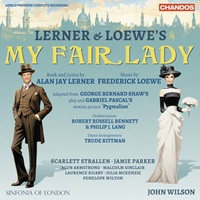 Studio Cast, 2025 (Chandos, 2CDs)
Studio Cast, 2025 (Chandos, 2CDs)  (4.5 / 5) This first-rate studio cast entry in the My Fair Lady discography begins with arguably the best performance of the show’s overture ever recorded; aided by superb audio engineering and state-of-the-art digital sound, conductor John Wilson leads the Sinfonia of London in a definitive presentation of these three minutes of musical theater heaven. Happily, such excellence exists throughout the entire album, which, like its predecessor on the JAY label, is a note-complete recording of the score. Here we also get large chunks of delicious dialogue as lead-ins to the songs and wherever the spoken word is closely interwoven with music. The pacing of the performance is exemplary and sometimes revelatory — for instance, the very slow and tentative beginning of “The Rain in Spain,” as Eliza is trying with all her might to pronounce that phrase properly, followed by a steady, exciting build of tempo as Higgins, Pickering, and Eliza herself are thrilled to realize that she has finally “got it.” In terms of casting, all is more than well: Jamie Parker is an energetic, youthful Higgins, petulant as appropriate yet refreshingly and effectively underplaying several of the character’s more emotional moments. Guided no doubt by Wilson, Parker makes consistently smart choices regarding how much of the role to declaim in sprechstimme and how much to actually sing. If Scarlett Strallen doesn’t deliver Lerner’s lyrics quite so pointedly as did Julie Andrews and some other previous Eliza Doolittles, she’s still a great pleasure to hear in the role due to her gorgeous soprano voice, and as is true of any successful Eliza, she sports convincing accents as both the Cockney flower girl and the grand lady of society. On the minus side, Malcolm Sinclair lacks the right sort of jolly-old-English comic style one wants in Pickering, but Laurence Kilsby as Freddy sings “On the Street Where You Live” ardently, and Alun Armstrong is a delight as Alfie Doolittle. Vivid cameos by Julia McKenzie as Mrs. Peace and Penelope Wilton as Mrs. Higgins are icing on this delectable cake. Bonus tracks include such interesting cut material as Higgins’ song “Come to the Ball,” an alternate version of “On the Street Where You Live” with an entirely different introductory section, and Eliza’s “Say a Prayer for Me Tonight,” which of course found its way into the score of Gigi. — M.P.
(4.5 / 5) This first-rate studio cast entry in the My Fair Lady discography begins with arguably the best performance of the show’s overture ever recorded; aided by superb audio engineering and state-of-the-art digital sound, conductor John Wilson leads the Sinfonia of London in a definitive presentation of these three minutes of musical theater heaven. Happily, such excellence exists throughout the entire album, which, like its predecessor on the JAY label, is a note-complete recording of the score. Here we also get large chunks of delicious dialogue as lead-ins to the songs and wherever the spoken word is closely interwoven with music. The pacing of the performance is exemplary and sometimes revelatory — for instance, the very slow and tentative beginning of “The Rain in Spain,” as Eliza is trying with all her might to pronounce that phrase properly, followed by a steady, exciting build of tempo as Higgins, Pickering, and Eliza herself are thrilled to realize that she has finally “got it.” In terms of casting, all is more than well: Jamie Parker is an energetic, youthful Higgins, petulant as appropriate yet refreshingly and effectively underplaying several of the character’s more emotional moments. Guided no doubt by Wilson, Parker makes consistently smart choices regarding how much of the role to declaim in sprechstimme and how much to actually sing. If Scarlett Strallen doesn’t deliver Lerner’s lyrics quite so pointedly as did Julie Andrews and some other previous Eliza Doolittles, she’s still a great pleasure to hear in the role due to her gorgeous soprano voice, and as is true of any successful Eliza, she sports convincing accents as both the Cockney flower girl and the grand lady of society. On the minus side, Malcolm Sinclair lacks the right sort of jolly-old-English comic style one wants in Pickering, but Laurence Kilsby as Freddy sings “On the Street Where You Live” ardently, and Alun Armstrong is a delight as Alfie Doolittle. Vivid cameos by Julia McKenzie as Mrs. Peace and Penelope Wilton as Mrs. Higgins are icing on this delectable cake. Bonus tracks include such interesting cut material as Higgins’ song “Come to the Ball,” an alternate version of “On the Street Where You Live” with an entirely different introductory section, and Eliza’s “Say a Prayer for Me Tonight,” which of course found its way into the score of Gigi. — M.P.
The Music Man
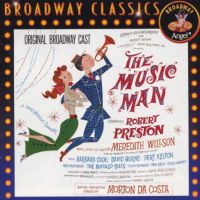 Original Broadway Cast, 1957 (Capitol)
Original Broadway Cast, 1957 (Capitol)  (5 / 5) This is one of the greatest of all cast albums. Meredith Willson, in his first Broadway effort, wrote the colorful, varied music and lyrics. The score of The Music Man is full of innovation, beginning with the unconventional opening “Rock Island,” in which a group of traveling salesmen rhythmically discuss how Harold Hill is ruining their business — instant exposition in a musical number with no actual singing! There follows an excellent chorale that introduces the “Iowa Stubborn” townspeople. After having been turned down by song-and-dance men Danny Kaye and Gene Kelly, the role of “Professor” Hill went to Robert Preston, an established stage/screen actor who had no prior musical credits. And what a blessing that turned out to be. Preston is mesmerizing in the half-spoken, half-sung “Trouble” and he sings “Seventy-Six Trombones” with enormous skill and gusto. His rendition of “The Sadder-but-Wiser Girl” reveals a vaudevillian’s pizzazz, yet he also sounds fully at home in the soft-shoe-tempo love song “Marian the Librarian” and holds his own in the ballad “Till There Was You.” Most of that ballad is sung by Barbara Cook, arguably the greatest soprano leading lady/ingenue in Broadway history. After a delightful “Piano Lesson” (Marian telling her mom, played by Pert Kelton, about Harold Hill having followed her home), Cook takes the beautiful “Goodnight My Someone” and makes it shimmer. When she sings about the man of her dreams in “My White Knight,” it’s a perfect expression of romantic yearning. And when Marian’s emotions explode in the discovery of “Till There Was You,” it’s one of those rare moments when a cast album gives you the thrill of a live performance. The Buffalo Bills do excellent barbershop-quartet singing. Eddie Hodges, as little brother Winthrop, lisps charmingly through “Gary, Indiana” and adds to the excitement of “The Wells Fargo Wagon.” And Iggie Wolfington, as Marcellus, has great fun with “Shipoopi.” The one thing missing is the complete original overture. While it may be hard to comprehend how The Music Man won the Tony Award for Best Musical over West Side Story, this album does make it clear why the show was such a hit. — Jeffrey Dunn
(5 / 5) This is one of the greatest of all cast albums. Meredith Willson, in his first Broadway effort, wrote the colorful, varied music and lyrics. The score of The Music Man is full of innovation, beginning with the unconventional opening “Rock Island,” in which a group of traveling salesmen rhythmically discuss how Harold Hill is ruining their business — instant exposition in a musical number with no actual singing! There follows an excellent chorale that introduces the “Iowa Stubborn” townspeople. After having been turned down by song-and-dance men Danny Kaye and Gene Kelly, the role of “Professor” Hill went to Robert Preston, an established stage/screen actor who had no prior musical credits. And what a blessing that turned out to be. Preston is mesmerizing in the half-spoken, half-sung “Trouble” and he sings “Seventy-Six Trombones” with enormous skill and gusto. His rendition of “The Sadder-but-Wiser Girl” reveals a vaudevillian’s pizzazz, yet he also sounds fully at home in the soft-shoe-tempo love song “Marian the Librarian” and holds his own in the ballad “Till There Was You.” Most of that ballad is sung by Barbara Cook, arguably the greatest soprano leading lady/ingenue in Broadway history. After a delightful “Piano Lesson” (Marian telling her mom, played by Pert Kelton, about Harold Hill having followed her home), Cook takes the beautiful “Goodnight My Someone” and makes it shimmer. When she sings about the man of her dreams in “My White Knight,” it’s a perfect expression of romantic yearning. And when Marian’s emotions explode in the discovery of “Till There Was You,” it’s one of those rare moments when a cast album gives you the thrill of a live performance. The Buffalo Bills do excellent barbershop-quartet singing. Eddie Hodges, as little brother Winthrop, lisps charmingly through “Gary, Indiana” and adds to the excitement of “The Wells Fargo Wagon.” And Iggie Wolfington, as Marcellus, has great fun with “Shipoopi.” The one thing missing is the complete original overture. While it may be hard to comprehend how The Music Man won the Tony Award for Best Musical over West Side Story, this album does make it clear why the show was such a hit. — Jeffrey Dunn
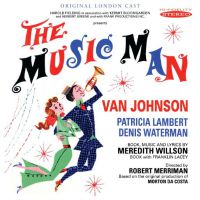 Original London Cast, 1961 (HMV/Sepia)
Original London Cast, 1961 (HMV/Sepia)  (2 / 5) In the London production of The Music Man, Van Johnson played Harold Hill. The film star was a selling point at the box office, and he also brought a real American presence to the British cast. This recording is a fun listen, if not distinctive. Johnson’s performance is more than pleasant, and Patricia Lambert sings beautifully as Marian. A particular standout is the Winthrop, Denis Waterman. A regrettably abridged version of this album was released on a budget-priced CD by Laserlight in 1995; missing from it were “Iowa Stubborn,” “Piano Lesson,” “Sincere,” “The Sadder-but-Wiser Girl,” “My White Knight,” and “Shipoopi.” Go with the more recent Sepia CD edition, which presents the complete recording. — J.D.
(2 / 5) In the London production of The Music Man, Van Johnson played Harold Hill. The film star was a selling point at the box office, and he also brought a real American presence to the British cast. This recording is a fun listen, if not distinctive. Johnson’s performance is more than pleasant, and Patricia Lambert sings beautifully as Marian. A particular standout is the Winthrop, Denis Waterman. A regrettably abridged version of this album was released on a budget-priced CD by Laserlight in 1995; missing from it were “Iowa Stubborn,” “Piano Lesson,” “Sincere,” “The Sadder-but-Wiser Girl,” “My White Knight,” and “Shipoopi.” Go with the more recent Sepia CD edition, which presents the complete recording. — J.D.
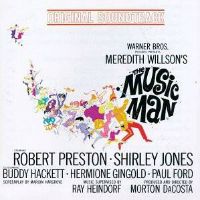 Film Soundtrack, 1962 (Warner Bros.)
Film Soundtrack, 1962 (Warner Bros.)  (4 / 5) Your feelings about this recording will depend on several things: Do you prefer Hollywood’s Shirley Jones to Broadway’s Barbara Cook? Do you favor the souped-up movie arrangements/orchestrations, or the stage originals? Do you think the conventional ballad “Being in Love” is an improvement over the more complex “My White Knight?” Would you rather hear Robert Preston’s Harold Hill as he sounded when the show first opened, or after he had been playing the role for a few years? Since responses to all of those questions are highly subjective, I won’t try to convince you one way or the other. Anyway, of primary importance is Preston — and on this disc, his Harold Hill is as spontaneous and irreplaceable as ever. Buddy Hackett is an engaging Marcellus, Hermione Gingold makes a major impact in her few vocal moments, and Ronnie Howard is delightful as Winthrop. Pert Kelton wonderfully reprises her Broadway role as Mrs. Paroo, and The Buffalo Bills are also on hand again. — J.D.
(4 / 5) Your feelings about this recording will depend on several things: Do you prefer Hollywood’s Shirley Jones to Broadway’s Barbara Cook? Do you favor the souped-up movie arrangements/orchestrations, or the stage originals? Do you think the conventional ballad “Being in Love” is an improvement over the more complex “My White Knight?” Would you rather hear Robert Preston’s Harold Hill as he sounded when the show first opened, or after he had been playing the role for a few years? Since responses to all of those questions are highly subjective, I won’t try to convince you one way or the other. Anyway, of primary importance is Preston — and on this disc, his Harold Hill is as spontaneous and irreplaceable as ever. Buddy Hackett is an engaging Marcellus, Hermione Gingold makes a major impact in her few vocal moments, and Ronnie Howard is delightful as Winthrop. Pert Kelton wonderfully reprises her Broadway role as Mrs. Paroo, and The Buffalo Bills are also on hand again. — J.D.
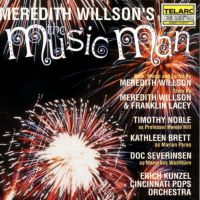 Studio Cast, 1991 (Telarc)
Studio Cast, 1991 (Telarc)  (1 / 5)This recording features Erich Kunzel conducting the Cincinnati Pops Orchestra; it uses a mixture of the Broadway and film orchestrations of the score. Included are “My White Knight,” “Being in Love,” and Harold Hill’s version of “Gary, Indiana.” The orchestrations are credited to Don Walker (Broadway), Ray Heindorf (film), and four other gentlemen — so if the album doesn’t sound consistently theatrical, small wonder. The movie’s overture is also here, along with dance music that seems an amalgam of the stage and film versions, none of it played with much excitement. There is a huge chorus: the Indiana University Singing Hoosiers. Timothy Noble plays the title role; the notes refer to him as a leading operatic baritone, but his portrayal of Harold Hill is way off the mark. Marian is played by Kathleen Brett, a Canadian soprano who has a pure, pretty voice but does not ignite any sparks. Doc Severinsen plays Marcellus and leads “Shipoopi” with some energy, but the rest of the supporting cast is uninteresting. So, why does this recording deserve even one star? The “It’s You” ballet, previously unrecorded, is included here. Also of interest is a counterpoint version of “My White Knight” and “The Sadder-but-Wiser Girl.” — J.D.
(1 / 5)This recording features Erich Kunzel conducting the Cincinnati Pops Orchestra; it uses a mixture of the Broadway and film orchestrations of the score. Included are “My White Knight,” “Being in Love,” and Harold Hill’s version of “Gary, Indiana.” The orchestrations are credited to Don Walker (Broadway), Ray Heindorf (film), and four other gentlemen — so if the album doesn’t sound consistently theatrical, small wonder. The movie’s overture is also here, along with dance music that seems an amalgam of the stage and film versions, none of it played with much excitement. There is a huge chorus: the Indiana University Singing Hoosiers. Timothy Noble plays the title role; the notes refer to him as a leading operatic baritone, but his portrayal of Harold Hill is way off the mark. Marian is played by Kathleen Brett, a Canadian soprano who has a pure, pretty voice but does not ignite any sparks. Doc Severinsen plays Marcellus and leads “Shipoopi” with some energy, but the rest of the supporting cast is uninteresting. So, why does this recording deserve even one star? The “It’s You” ballet, previously unrecorded, is included here. Also of interest is a counterpoint version of “My White Knight” and “The Sadder-but-Wiser Girl.” — J.D.
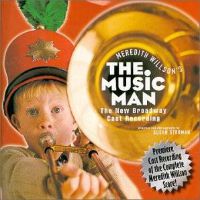 Broadway Cast, 2000 (Q Records)
Broadway Cast, 2000 (Q Records)  (1 / 5) Onstage, Craig Bierko sounded so astonishingly like Robert Preston in the title role of The Music Man that the actor’s own personality never emerged. On this cast album, the similarity is great enough to be spooky; you may wonder, “Which recording did I put on?” Since any successful production or recording of this show must have a dynamic Harold Hill, Bierko is a major handicap. On the plus side, Rebecca Luker’s performances of “Goodnight, My Someone” and “My White Knight” are beautifully sung. The barbershop quartet is also fine, but adding the voices of Harold and Mrs. Paroo (Katherine McGrath) to “Gary, Indiana” barely allows Michael Phelan to register as Winthrop. Finally, while the album contains almost every bit of music that was heard in this revival, along with dialogue to add dramatic punch, the new orchestrations (by Doug Besterman) and dance arrangements (by David Crane) aren’t improvements on the originals. In fact, adding accompaniment to “Rock Island” is harmful, as the lyrics don’t fall as pungently on the ear. — J.D.
(1 / 5) Onstage, Craig Bierko sounded so astonishingly like Robert Preston in the title role of The Music Man that the actor’s own personality never emerged. On this cast album, the similarity is great enough to be spooky; you may wonder, “Which recording did I put on?” Since any successful production or recording of this show must have a dynamic Harold Hill, Bierko is a major handicap. On the plus side, Rebecca Luker’s performances of “Goodnight, My Someone” and “My White Knight” are beautifully sung. The barbershop quartet is also fine, but adding the voices of Harold and Mrs. Paroo (Katherine McGrath) to “Gary, Indiana” barely allows Michael Phelan to register as Winthrop. Finally, while the album contains almost every bit of music that was heard in this revival, along with dialogue to add dramatic punch, the new orchestrations (by Doug Besterman) and dance arrangements (by David Crane) aren’t improvements on the originals. In fact, adding accompaniment to “Rock Island” is harmful, as the lyrics don’t fall as pungently on the ear. — J.D.
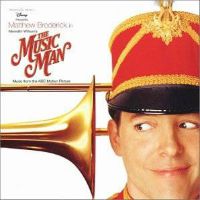 Television Film Soundtrack, 2003 (Disney)
Television Film Soundtrack, 2003 (Disney)  (1 / 5) The casting of Matthew Broderick as Harold Hill was controversial, to say the least. Some viewers of this TV film may have gradually fallen under Broderick’s spell and, by the final scenes, may have bought into his subtle characterization. On the soundtrack recording, however, his performances of “Trouble” and “Seventy-Six Trombones” are simply too low-key. Broderick does a little better with “The Sadder-but-Wiser Girl” and “Marian the Librarian,” but Hill’s first two songs must establish the character strongly for the show to work. On the plus side, Kristin Chenoweth’s Marian is enchanting. The supporting players are all good actors who sing well, but their vocals don’t have much éclat and often seem muted. Some of the musical changes that were made for the big-screen version of The Music Man are included here, but how nice that Chenoweth sings “My White Knight” instead of the inferior “Being in Love.” — J.D.
(1 / 5) The casting of Matthew Broderick as Harold Hill was controversial, to say the least. Some viewers of this TV film may have gradually fallen under Broderick’s spell and, by the final scenes, may have bought into his subtle characterization. On the soundtrack recording, however, his performances of “Trouble” and “Seventy-Six Trombones” are simply too low-key. Broderick does a little better with “The Sadder-but-Wiser Girl” and “Marian the Librarian,” but Hill’s first two songs must establish the character strongly for the show to work. On the plus side, Kristin Chenoweth’s Marian is enchanting. The supporting players are all good actors who sing well, but their vocals don’t have much éclat and often seem muted. Some of the musical changes that were made for the big-screen version of The Music Man are included here, but how nice that Chenoweth sings “My White Knight” instead of the inferior “Being in Love.” — J.D.
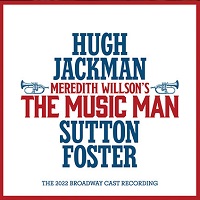 Broadway Cast, 2022 (Accidental Jacket Entertainment)
Broadway Cast, 2022 (Accidental Jacket Entertainment)  (1 / 5) After the COVID-19 pandemic had shut down theatre for nearly two years, Broadway needed a hit to entice audiences back to NYC and live performances. Enter Hugh Jackman and Sutton Foster, headlining an expensive, old-fashioned staging of The Music Man. The show proved to be a major success in terms of ticket sales, but artistically, its merits are arguable, as evidenced by the cast recording. On the plus side, we have a full, rich-sounding orchestra and a large, robust ensemble performing Meredith Willson’s score for maximum impact. Jonathan Tunick’s orchestrations are mostly lush and appropriate, following the mold of Don Walker’s originals (except for added percussion in “Rock Island”). This is also perhaps the most complete of any Music Man recording to date, including every bar of incidental music as well as large excerpts of dialogue. However, there are major setbacks. First, there’s a “Shipoopi” with rewritten lyrics (by Marc Shaiman and Scott Wittman) that are meant to address recent complaints about the original version’s gender politics. Sung by Shuler Hensley, whose gruff baritone is a mismatch for the role of the impish Marcellus, this new version of the song is far less fun than the original. But most detrimental to the recording are the performances of Jackman and Foster. Though Jackman gives his all to Harold Hill’s songs, he sounds tired and strained, and over-singing causes many of his musical moments to come across as effortful rather than effortless. Foster, meanwhile, is vocally wrong for Marian Paroo, each of her songs having been reconfigured to accommodate her brassy belt rather than challenge her to engage her soprano register. As a result, none of these songs soar as they did when sung by Barbara Cook or Rebecca Luker for previous recordings. One of the most disappointing tracks here is “My White Knight,” presented in an earlier version by Willson that features a lengthy patter section at the beginning. With the definitive original cast recording, the fantastic movie soundtrack, and the 2000 revival cast album available, this Music Man feels more incidental than essential. — Matt Koplik
(1 / 5) After the COVID-19 pandemic had shut down theatre for nearly two years, Broadway needed a hit to entice audiences back to NYC and live performances. Enter Hugh Jackman and Sutton Foster, headlining an expensive, old-fashioned staging of The Music Man. The show proved to be a major success in terms of ticket sales, but artistically, its merits are arguable, as evidenced by the cast recording. On the plus side, we have a full, rich-sounding orchestra and a large, robust ensemble performing Meredith Willson’s score for maximum impact. Jonathan Tunick’s orchestrations are mostly lush and appropriate, following the mold of Don Walker’s originals (except for added percussion in “Rock Island”). This is also perhaps the most complete of any Music Man recording to date, including every bar of incidental music as well as large excerpts of dialogue. However, there are major setbacks. First, there’s a “Shipoopi” with rewritten lyrics (by Marc Shaiman and Scott Wittman) that are meant to address recent complaints about the original version’s gender politics. Sung by Shuler Hensley, whose gruff baritone is a mismatch for the role of the impish Marcellus, this new version of the song is far less fun than the original. But most detrimental to the recording are the performances of Jackman and Foster. Though Jackman gives his all to Harold Hill’s songs, he sounds tired and strained, and over-singing causes many of his musical moments to come across as effortful rather than effortless. Foster, meanwhile, is vocally wrong for Marian Paroo, each of her songs having been reconfigured to accommodate her brassy belt rather than challenge her to engage her soprano register. As a result, none of these songs soar as they did when sung by Barbara Cook or Rebecca Luker for previous recordings. One of the most disappointing tracks here is “My White Knight,” presented in an earlier version by Willson that features a lengthy patter section at the beginning. With the definitive original cast recording, the fantastic movie soundtrack, and the 2000 revival cast album available, this Music Man feels more incidental than essential. — Matt Koplik
Music in the Air
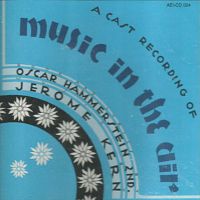 Radio Broadcast, 1952 (AEI)
Radio Broadcast, 1952 (AEI)  (1 / 5) If Music in the Air sounds like the title of a hokey operetta, that’s intentional; the 1932 show, with music by Jerome Kern, book and lyrics by Oscar Hammerstein, took an amused look at that genre and the egos toiling in it. The plot concerns two small-town lovers who journey to Munich with the score of her father’s show and promptly tangle with an egotistical composer-star and his muse, an over-the-top diva. The couples trade partners, but when the village girl fails to make the grade as an operetta star, the natural order of things is restored. Meanwhile, the audience is treated to such gems as “The Song Is You” and “I’ve Told Ev’ry Little Star.” This CD is drawn from the transcript of a cut-down radio version of the show, complete with a narrator and overwrought actors who speak the lines while other performers take care of the songs. Musically, it’s not a bad performance; there’s decent singing by people you’ve never heard of, plus an adequate orchestra and chorus, all in listenable sound. But the dialogue and plot have been mangled beyond recognition, and there’s no option for skipping over the “drama” tracks to hear just the songs. It’s fortunate that this document of the show exists, but Music in the Air deserves better. — Richard Barrios
(1 / 5) If Music in the Air sounds like the title of a hokey operetta, that’s intentional; the 1932 show, with music by Jerome Kern, book and lyrics by Oscar Hammerstein, took an amused look at that genre and the egos toiling in it. The plot concerns two small-town lovers who journey to Munich with the score of her father’s show and promptly tangle with an egotistical composer-star and his muse, an over-the-top diva. The couples trade partners, but when the village girl fails to make the grade as an operetta star, the natural order of things is restored. Meanwhile, the audience is treated to such gems as “The Song Is You” and “I’ve Told Ev’ry Little Star.” This CD is drawn from the transcript of a cut-down radio version of the show, complete with a narrator and overwrought actors who speak the lines while other performers take care of the songs. Musically, it’s not a bad performance; there’s decent singing by people you’ve never heard of, plus an adequate orchestra and chorus, all in listenable sound. But the dialogue and plot have been mangled beyond recognition, and there’s no option for skipping over the “drama” tracks to hear just the songs. It’s fortunate that this document of the show exists, but Music in the Air deserves better. — Richard Barrios
The Musical of Musicals: The Musical!
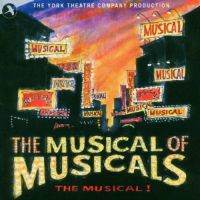 Original Off-Broadway Cast, 2004 (JAY)
Original Off-Broadway Cast, 2004 (JAY)  (1 / 5) This is Eric Rockwell and Joanne Bogart’s attempt to parody hit musicals by taking one melodramatic story (a landlord trying to secure rent money from his tenant) and presenting it in the “styles” of famous composers and lyricists. What might have been fun in the right hands proves to be pretty much a catastrophe, for these send-ups of Rodgers and Hammerstein, Stephen Sondheim, Jerry Herman, Andrew Lloyd Webber, and Kander and Ebb lack real wit. A few decent laughs are derived from the similarities between Webber tunes and Puccini melodies, but that’s about it; the bulk of the score is dreary, taking shots so obvious as to defy humor. For example, the R&H spoof — titled “Corn!” — includes songs titled “I Couldn’t Keer Less About You,” “Sowillyquey,” and “Clam Dip.” Other segments capitalize on tired stereotypes, with very little creative ribbing achieved. All of the performers — Rockwell, Bogart, Craig Fols, and Lovette George — are fine, but they can only do so much with the material. This recording receives one star because it’s superior to the show that spawned it; the faster pace is a plus, and the narration is less distracting than it was in the theater. — Matthew Murray
(1 / 5) This is Eric Rockwell and Joanne Bogart’s attempt to parody hit musicals by taking one melodramatic story (a landlord trying to secure rent money from his tenant) and presenting it in the “styles” of famous composers and lyricists. What might have been fun in the right hands proves to be pretty much a catastrophe, for these send-ups of Rodgers and Hammerstein, Stephen Sondheim, Jerry Herman, Andrew Lloyd Webber, and Kander and Ebb lack real wit. A few decent laughs are derived from the similarities between Webber tunes and Puccini melodies, but that’s about it; the bulk of the score is dreary, taking shots so obvious as to defy humor. For example, the R&H spoof — titled “Corn!” — includes songs titled “I Couldn’t Keer Less About You,” “Sowillyquey,” and “Clam Dip.” Other segments capitalize on tired stereotypes, with very little creative ribbing achieved. All of the performers — Rockwell, Bogart, Craig Fols, and Lovette George — are fine, but they can only do so much with the material. This recording receives one star because it’s superior to the show that spawned it; the faster pace is a plus, and the narration is less distracting than it was in the theater. — Matthew Murray
Musical Chairs
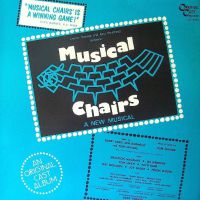 Original Broadway Cast, 1980 (Original Cast Records/no CD) No stars; not recommended. After only 14 performances, Musical Chairs vanished from sight, but the show yielded a cast album. The episodic “plot” concerns the folks in the audience on opening night of a play. Everyone, it seems, gets a song: the playwright (Tom Urich); two bitter playgoers (Brandon Maggart and Joy Franz) who have been dragged to the show by their spouses; another playgoer (Scott Ellis!) whose date (Susan Stroman!) shows up very late; some amateur divas; and a trio of tap-dancing critics. There’s even a song about hitting the ladies’ room — which, naturally, closes the first act. Composer-lyricist Tom Savage, who’s also one of the three bookwriters credited, provided a few better-than-mediocre pop-ballad melodies, but the up-tempo numbers are silly, and most of the lyrics are pretty terrible. (Example: “Give me some time for analysis / I’ll find their strengths and their fallacies.”) Unless you’re a Brandon Maggart completist, this recording isn’t worth your time. — Seth Christenfeld
Original Broadway Cast, 1980 (Original Cast Records/no CD) No stars; not recommended. After only 14 performances, Musical Chairs vanished from sight, but the show yielded a cast album. The episodic “plot” concerns the folks in the audience on opening night of a play. Everyone, it seems, gets a song: the playwright (Tom Urich); two bitter playgoers (Brandon Maggart and Joy Franz) who have been dragged to the show by their spouses; another playgoer (Scott Ellis!) whose date (Susan Stroman!) shows up very late; some amateur divas; and a trio of tap-dancing critics. There’s even a song about hitting the ladies’ room — which, naturally, closes the first act. Composer-lyricist Tom Savage, who’s also one of the three bookwriters credited, provided a few better-than-mediocre pop-ballad melodies, but the up-tempo numbers are silly, and most of the lyrics are pretty terrible. (Example: “Give me some time for analysis / I’ll find their strengths and their fallacies.”) Unless you’re a Brandon Maggart completist, this recording isn’t worth your time. — Seth Christenfeld
Movin’ Out
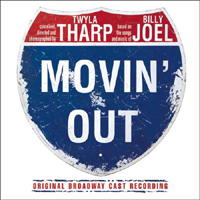 Original Broadway Cast, 2002 (Sony)
Original Broadway Cast, 2002 (Sony)  (4 / 5) In the old days, composers hoped that theatergoers would go out humming what they’d just heard. With shows like Movin’ Out, however, the idea is that the audience will be humming the show’s melodies on the way in. Sure, this is an original cast recording, but the singer featured on it did not introduce the songs that make up the score; every rock ‘n’ roll number that Michael Cavanaugh warbles and plays on piano with exuberance was popularized by singer-songwriter Billy Joel on albums that have sold in the millions. Cavanaugh hews to Joel’s phrasing and inflections while bringing his own distinctive talents to the likes of “Just the Way You Are,” “Uptown Girl,” “We Didn’t Start the Fire,” “Captain Jack,” and “I’ve Loved These Days.” Additionally, there’s some thrilling instrumental work by the sidemen, particularly by saxophonist John Scarpulla. While this is an expertly produced aural document of a spectacular and important show, it’s obviously incomplete in one major respect: Director-choreographer Twyla Tharp created a visual masterwork around Joel’s triumphs as a troubadour-chronicler of his troubled pre- and post-Vietnam times but, of course, there was no way for CD producers Tommy Byrnes and Mike Berniker to make an audio recording of Tharp’s extraordinary staging and dances. So this cast album is a must-have with that qualification, and one more: Needless to say, if you want the definitive recordings of these songs, you should pick up Joel’s versions. — David Finkle
(4 / 5) In the old days, composers hoped that theatergoers would go out humming what they’d just heard. With shows like Movin’ Out, however, the idea is that the audience will be humming the show’s melodies on the way in. Sure, this is an original cast recording, but the singer featured on it did not introduce the songs that make up the score; every rock ‘n’ roll number that Michael Cavanaugh warbles and plays on piano with exuberance was popularized by singer-songwriter Billy Joel on albums that have sold in the millions. Cavanaugh hews to Joel’s phrasing and inflections while bringing his own distinctive talents to the likes of “Just the Way You Are,” “Uptown Girl,” “We Didn’t Start the Fire,” “Captain Jack,” and “I’ve Loved These Days.” Additionally, there’s some thrilling instrumental work by the sidemen, particularly by saxophonist John Scarpulla. While this is an expertly produced aural document of a spectacular and important show, it’s obviously incomplete in one major respect: Director-choreographer Twyla Tharp created a visual masterwork around Joel’s triumphs as a troubadour-chronicler of his troubled pre- and post-Vietnam times but, of course, there was no way for CD producers Tommy Byrnes and Mike Berniker to make an audio recording of Tharp’s extraordinary staging and dances. So this cast album is a must-have with that qualification, and one more: Needless to say, if you want the definitive recordings of these songs, you should pick up Joel’s versions. — David Finkle
The Most Happy Fella
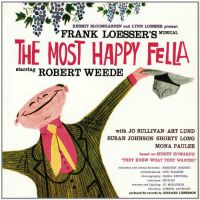 Original Broadway Cast, 1956 (Columbia/Sony, 2CDs)
Original Broadway Cast, 1956 (Columbia/Sony, 2CDs)  (5 / 5) When Frank Loesser’s adaptation of Sidney Howard’s They Knew What They Wanted opened on Broadway, the composer-lyricist quickly corrected those who suggested that he had written an opera. “Actually,” he said, “it’s just a musical with a lot of music.” Happily, The Most Happy Fella was recorded complete and released as a three-LP album (and also as a single LP of highlights). The two-CD edition gives us a rare chance to sample a mid-’50s hit in its entirety, dialogue and all. The recording is noteworthy for Don Walker’s lush orchestrations and underscoring, the cast’s emphatic line readings and rich voices, and Loesser’s stretching of the art form’s borders in terms of both musical style and morality. (The plot concerns a bride who is unfaithful on her wedding night, yet doesn’t get struck by lightning.) Yes, the score careens between musical comedy silliness and operatic intensity, some of the acting is artless, and there’s perhaps a bit too much repetition in the lyrics; but none of that matters, because Loesser’s musical storytelling is so passionate, his sympathy for his characters limitless, and the show is so sincere and honest a portrayal of adult romance. As Tony Esposito, ex-Met baritone Robert Weede is superb; no one has ever surpassed him in the role. Jo Sullivan, as his pretty “Rosabella,” uses her rather thin top notes effectively to communicate vulnerability. (In a real-life romance, Sullivan and Loesser apparently fell in love during the run of Happy Fella and married in 1959 — after he divorced his first wife, Lynn, who had been one of the show’s two co-producers.) Susan Johnson is the definitive Cleo, while Art Lund captures Joe’s restlessness in “Joey, Joey, Joey.” Herbert Greene conducts with all of the sweep that this unique score requires. Although the album was recorded before Columbia switched to stereo, the mono sound is crisp and resonant. For those who love a really good love story, this is a tremendously moving performance — so much so that when Tony asks, “Young lady, what’s-a you name?” in the final scene, and “Rosabella” offers her surprising reply, you may weep with happiness for both of them. — Marc Miller
(5 / 5) When Frank Loesser’s adaptation of Sidney Howard’s They Knew What They Wanted opened on Broadway, the composer-lyricist quickly corrected those who suggested that he had written an opera. “Actually,” he said, “it’s just a musical with a lot of music.” Happily, The Most Happy Fella was recorded complete and released as a three-LP album (and also as a single LP of highlights). The two-CD edition gives us a rare chance to sample a mid-’50s hit in its entirety, dialogue and all. The recording is noteworthy for Don Walker’s lush orchestrations and underscoring, the cast’s emphatic line readings and rich voices, and Loesser’s stretching of the art form’s borders in terms of both musical style and morality. (The plot concerns a bride who is unfaithful on her wedding night, yet doesn’t get struck by lightning.) Yes, the score careens between musical comedy silliness and operatic intensity, some of the acting is artless, and there’s perhaps a bit too much repetition in the lyrics; but none of that matters, because Loesser’s musical storytelling is so passionate, his sympathy for his characters limitless, and the show is so sincere and honest a portrayal of adult romance. As Tony Esposito, ex-Met baritone Robert Weede is superb; no one has ever surpassed him in the role. Jo Sullivan, as his pretty “Rosabella,” uses her rather thin top notes effectively to communicate vulnerability. (In a real-life romance, Sullivan and Loesser apparently fell in love during the run of Happy Fella and married in 1959 — after he divorced his first wife, Lynn, who had been one of the show’s two co-producers.) Susan Johnson is the definitive Cleo, while Art Lund captures Joe’s restlessness in “Joey, Joey, Joey.” Herbert Greene conducts with all of the sweep that this unique score requires. Although the album was recorded before Columbia switched to stereo, the mono sound is crisp and resonant. For those who love a really good love story, this is a tremendously moving performance — so much so that when Tony asks, “Young lady, what’s-a you name?” in the final scene, and “Rosabella” offers her surprising reply, you may weep with happiness for both of them. — Marc Miller
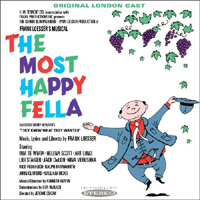 Original London Cast, 1960 (His Master’s Voice/Angel/Sepia)
Original London Cast, 1960 (His Master’s Voice/Angel/Sepia)  (3 / 5) The first stereo recording of Frank Loesser’s great romantic musical is a fine one, though it’s limited to as much of the score as could fit on one LP. The West End production wisely imported several of its principals from New York, ensuring authentic American accents. Helena Scott is a lovely Rosabella, while Libi Staiger is a superb, rafter-raising Cleo, well partnered by Jack DeLon’s Herman. The Maori bass-baritone Inia Te Wiata has voice to spare and the requisite sincerity for Tony, even if perhaps he overdoes the hearty peasant thing; just hear him burble “Ornma so happy-happy, omma t’ink omma gonna bust!” Reprising his New York role of Joe, Art Lund sounds a little tired here. But the editing of the score is judicious, and the luscious stereo sound — even as heard on the Sepia CD, which was transferred from an LP copy of the recording — brings out vocal and instrumental subtleties that the mono original couldn’t capture. “How Beautiful the Days,” for instance, sounds more beautiful than ever. — M.M.
(3 / 5) The first stereo recording of Frank Loesser’s great romantic musical is a fine one, though it’s limited to as much of the score as could fit on one LP. The West End production wisely imported several of its principals from New York, ensuring authentic American accents. Helena Scott is a lovely Rosabella, while Libi Staiger is a superb, rafter-raising Cleo, well partnered by Jack DeLon’s Herman. The Maori bass-baritone Inia Te Wiata has voice to spare and the requisite sincerity for Tony, even if perhaps he overdoes the hearty peasant thing; just hear him burble “Ornma so happy-happy, omma t’ink omma gonna bust!” Reprising his New York role of Joe, Art Lund sounds a little tired here. But the editing of the score is judicious, and the luscious stereo sound — even as heard on the Sepia CD, which was transferred from an LP copy of the recording — brings out vocal and instrumental subtleties that the mono original couldn’t capture. “How Beautiful the Days,” for instance, sounds more beautiful than ever. — M.M.
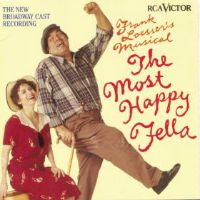 Broadway Cast, 1992 (RCA)
Broadway Cast, 1992 (RCA)  (2 / 5) The Goodspeed Opera House’s vest-pocket-size revival of Happy Fella was successful enough to transfer to Broadway’s cozy Booth Theater, where it ran out the season. The justification for turning this big musical into a smaller show was that the material would feel “more intimate,” and the substitution of two pianos for a full orchestra would bring audiences “closer” to the material. Excuse me, but Don Walker’s original orchestrations have never been emotionally distancing, nor do the two pianos heard here (plus an accordion in “Sposalizio” and a guitar in “Song of a Summer Night”) bring out any qualities previously lacking in Loesser’s music. The production was well acted and sung for the most part, although Spiro Malas as Tony is sometimes below pitch and often resorts to head voice, and Claudia Catania’s Marie is downright unpleasant. On the plus side, Sophie Hayden’s Rosabella is a fresh take on the role; she’s more tired, more resigned at first, and eventually, more transformed by love. The score was edited for this recording, which was originally released on one-CD — yet, somehow, nothing crucial seems to be missing. Still, pretending that “smaller is better” for this grandly ambitious piece is disingenuous. — M.M.
(2 / 5) The Goodspeed Opera House’s vest-pocket-size revival of Happy Fella was successful enough to transfer to Broadway’s cozy Booth Theater, where it ran out the season. The justification for turning this big musical into a smaller show was that the material would feel “more intimate,” and the substitution of two pianos for a full orchestra would bring audiences “closer” to the material. Excuse me, but Don Walker’s original orchestrations have never been emotionally distancing, nor do the two pianos heard here (plus an accordion in “Sposalizio” and a guitar in “Song of a Summer Night”) bring out any qualities previously lacking in Loesser’s music. The production was well acted and sung for the most part, although Spiro Malas as Tony is sometimes below pitch and often resorts to head voice, and Claudia Catania’s Marie is downright unpleasant. On the plus side, Sophie Hayden’s Rosabella is a fresh take on the role; she’s more tired, more resigned at first, and eventually, more transformed by love. The score was edited for this recording, which was originally released on one-CD — yet, somehow, nothing crucial seems to be missing. Still, pretending that “smaller is better” for this grandly ambitious piece is disingenuous. — M.M.
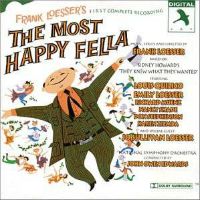 Studio Cast, 1999 (JAY, 3CDs)
Studio Cast, 1999 (JAY, 3CDs)  (4 / 5) Here’s a well-conducted Happy Fella that is also well-cast, for the most part, and is noteworthy for including bonus tracks of six songs/musical scenes that were cut from the score or extensively edited before the show opened on Broadway. A good deal of this material tells us more about the character Marie, Tony’s possessive sister, beautifully sung here by Nancy Shade. Among the other bonus tracks: “House and Garden,” which was included in the unrecorded (but videotaped) 1979 Broadway revival, offers a peek into Rosabella’s wistful side. And “Wanting to Be Wanted,” an earlier draft of “Somebody, Somewhere,” is given a sensitive reading by Jo Sullivan. Mrs. Loesser should be proud of her daughter Emily, whose Rosabella is vocally secure and acted with great range. Louis Quilico interprets Tony solidly, if unimaginatively, but there’s some vocal strain in his performance (he was in his seventies at the time of the recording). And Richard Muenz, who was a sexy Tony in the ’79 revival, sounds like he’s walking through the role here. On the plus side, Karen Ziemba’s Cleo is wonderful, and Don Stephenson’s Herman is ingratiating. Overall, this is a detailed, loving recording, with expert performers such as George Dvorsky, Walter Charles, and even Kristin Chenoweth taking tiny roles. Conductor John Owen Edwards doesn’t over-sentimentalize the score — and we can be grateful, too, for the inclusion of the stirring exit music. Generous packaging offers the complete libretto and numerous photos from both the original production and the recording sessions for this release. If I could have only one version, I’d still take Columbia’s Broadway cast album, but there’s value added in this luxurious tour. — M.M.
(4 / 5) Here’s a well-conducted Happy Fella that is also well-cast, for the most part, and is noteworthy for including bonus tracks of six songs/musical scenes that were cut from the score or extensively edited before the show opened on Broadway. A good deal of this material tells us more about the character Marie, Tony’s possessive sister, beautifully sung here by Nancy Shade. Among the other bonus tracks: “House and Garden,” which was included in the unrecorded (but videotaped) 1979 Broadway revival, offers a peek into Rosabella’s wistful side. And “Wanting to Be Wanted,” an earlier draft of “Somebody, Somewhere,” is given a sensitive reading by Jo Sullivan. Mrs. Loesser should be proud of her daughter Emily, whose Rosabella is vocally secure and acted with great range. Louis Quilico interprets Tony solidly, if unimaginatively, but there’s some vocal strain in his performance (he was in his seventies at the time of the recording). And Richard Muenz, who was a sexy Tony in the ’79 revival, sounds like he’s walking through the role here. On the plus side, Karen Ziemba’s Cleo is wonderful, and Don Stephenson’s Herman is ingratiating. Overall, this is a detailed, loving recording, with expert performers such as George Dvorsky, Walter Charles, and even Kristin Chenoweth taking tiny roles. Conductor John Owen Edwards doesn’t over-sentimentalize the score — and we can be grateful, too, for the inclusion of the stirring exit music. Generous packaging offers the complete libretto and numerous photos from both the original production and the recording sessions for this release. If I could have only one version, I’d still take Columbia’s Broadway cast album, but there’s value added in this luxurious tour. — M.M.
Mr. Wonderful
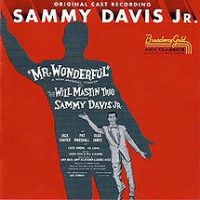 Original Broadway Cast, 1956 (Decca/MCA)
Original Broadway Cast, 1956 (Decca/MCA)  (4 / 5) From the moment the overture fires up, strings sawing away and trumpets blaring, you know that this is a mid-’50s boilerplate musical comedy. Produced (but not written) by Jule Styne to showcase the talents of Sammy Davis Jr., Mr. Wonderful leaves no convention unturned: There’s the frantic opening chorus (“1617 Broadway”), the second couple’s silly duet (“Without You I’m Nothing”), Davis’s swinging nightclub specialty (“Jacques D’Iraq”), the leading lady’s adoring title song, the comedienne’s pointless number with choral backup (“Miami”), and the other comedienne’s irrelevant song and dance turn (“I’m Available”). Davis’s socko 11-o’clock number is actually an old standard pulled out of the trunk (“Sing, You Sinners”), and Act II is basically the star’s nightclub act, so how much story has to be told? What makes all of this special is the cast: that “I’m Available” comedienne just happens to be Chita Rivera, while the other comic gal is Pat Marshall, so funny and leather-lunged that you wonder why she didn’t have more of a career. (Answer: She married Larry Gelbart and lived happily ever after.) Davis’s love interest, Olga James, displays a sweet soprano, but she can also wow us when given good comedy material (“Talk to Him,” “I’ve Been Too Busy”). And there are some good, tuneful songs here, written by a young Jerry Bock and George David Weiss. As for Davis, he’s so eager to show off his versatility — tapping, doing impersonations, hard-selling the hit song “Too Close for Comfort” — that he’s almost frantic. But it’s pleasing how little fuss is made about having a black leading couple (Davis-James), a white second couple (Marshall-Jack Carter), and making them all best friends. If you love the sound of this particular brand of mid-20th century Broadway musical fare, here’s a Grade-A specimen. If not, downgrade the rating to three stars. — Marc Miller
(4 / 5) From the moment the overture fires up, strings sawing away and trumpets blaring, you know that this is a mid-’50s boilerplate musical comedy. Produced (but not written) by Jule Styne to showcase the talents of Sammy Davis Jr., Mr. Wonderful leaves no convention unturned: There’s the frantic opening chorus (“1617 Broadway”), the second couple’s silly duet (“Without You I’m Nothing”), Davis’s swinging nightclub specialty (“Jacques D’Iraq”), the leading lady’s adoring title song, the comedienne’s pointless number with choral backup (“Miami”), and the other comedienne’s irrelevant song and dance turn (“I’m Available”). Davis’s socko 11-o’clock number is actually an old standard pulled out of the trunk (“Sing, You Sinners”), and Act II is basically the star’s nightclub act, so how much story has to be told? What makes all of this special is the cast: that “I’m Available” comedienne just happens to be Chita Rivera, while the other comic gal is Pat Marshall, so funny and leather-lunged that you wonder why she didn’t have more of a career. (Answer: She married Larry Gelbart and lived happily ever after.) Davis’s love interest, Olga James, displays a sweet soprano, but she can also wow us when given good comedy material (“Talk to Him,” “I’ve Been Too Busy”). And there are some good, tuneful songs here, written by a young Jerry Bock and George David Weiss. As for Davis, he’s so eager to show off his versatility — tapping, doing impersonations, hard-selling the hit song “Too Close for Comfort” — that he’s almost frantic. But it’s pleasing how little fuss is made about having a black leading couple (Davis-James), a white second couple (Marshall-Jack Carter), and making them all best friends. If you love the sound of this particular brand of mid-20th century Broadway musical fare, here’s a Grade-A specimen. If not, downgrade the rating to three stars. — Marc Miller
Mr. President
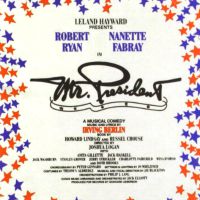 Original Broadway Cast, 1962 (Columbia/Sony)
Original Broadway Cast, 1962 (Columbia/Sony)  (1 / 5) Irving Berlin’s final show should have been a natural. It’s a look at a JFK-like First Family, with mild social satire and plenty of flag-waving. Unfortunately, from the listless opening fanfare to the desperate finale, it’s a bust. There’s scarcely a fresh idea in Mr. President, just a lot of recycling of old ones that were better executed by Berlin the first time: the latest dance craze (“The Washington Twist”), the contrapuntal duet (“Empty Pockets Filled With Love”), and the novelty number to wake up a drowsy Act II (“The Only Dance I Know”). In a nod to a song from Annie Get Your Gun, one character even announces, “The girl that I marry will have to be / Meat and potatoes, potatoes and meat like me.” (Huh?) Robert Ryan’s light tenor hardly conveys Chief Executive authority. As his First Lady, Nanette Fabray — always a pro — puts over “Let’s Go Back to the Waltz” and “They Love Me.” First Daughter Anita Gillette is fine in “The Secret Service.” The rest of the score is a major disappointment, and the Broadway talent delivering it has no chance against such feeble material. Not even Philip J. Lang’s orchestrations can spark the dispiriting arrangements; these songs just end. — Marc Miller
(1 / 5) Irving Berlin’s final show should have been a natural. It’s a look at a JFK-like First Family, with mild social satire and plenty of flag-waving. Unfortunately, from the listless opening fanfare to the desperate finale, it’s a bust. There’s scarcely a fresh idea in Mr. President, just a lot of recycling of old ones that were better executed by Berlin the first time: the latest dance craze (“The Washington Twist”), the contrapuntal duet (“Empty Pockets Filled With Love”), and the novelty number to wake up a drowsy Act II (“The Only Dance I Know”). In a nod to a song from Annie Get Your Gun, one character even announces, “The girl that I marry will have to be / Meat and potatoes, potatoes and meat like me.” (Huh?) Robert Ryan’s light tenor hardly conveys Chief Executive authority. As his First Lady, Nanette Fabray — always a pro — puts over “Let’s Go Back to the Waltz” and “They Love Me.” First Daughter Anita Gillette is fine in “The Secret Service.” The rest of the score is a major disappointment, and the Broadway talent delivering it has no chance against such feeble material. Not even Philip J. Lang’s orchestrations can spark the dispiriting arrangements; these songs just end. — Marc Miller
Mrs. Patterson
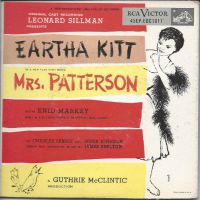 Original Broadway Cast, 1954 (RCA/Stage Door)
Original Broadway Cast, 1954 (RCA/Stage Door)  (1 / 5) Is it a musical, or a straight play with incidental songs? Mrs. Patterson was a hybrid oddity of the 1954-55 Broadway season. Having seen Eartha Kitt create a sensation in his revue New Faces of 1952, producer Leonard Sillman resolved to showcase the new star’s versatility in a role far from her kitten-fatale persona. The result — a play by Charles Sebree and Greer Johnson, with songs by James Shelton — was disappointing. The story of a young daydreamer, Mrs. Patterson ran for several months and was quickly forgotten, except for Kitt’s Tony nomination and this cast album. There are long dialogue patches that alternate with Shelton’s six songs, and while Kitt works hard to capture the voice and manner of a teen-aged innocent, the material is weak; the fey lyrics and wispy vocal lines of the songs seldom allow the star to have any fun. Ironically, the only number that’s at all striking (“I Wish I Was a Bumble Bee”) is sung not by Kitt, but by Helen Dowdy in the role of an over-the-hill blues singer. It’s highly unlikely that this show will ever turn up again onstage, so the cast album is a bona fide hothouse curiosity. For years, this recording was available on CD only as part of the five-disc boxed set Eartha Quake, from the Bear Family, but it was later packaged as a Stage Door CD that also includes the New Faces of 1956 cast album. — Richard Barrios
(1 / 5) Is it a musical, or a straight play with incidental songs? Mrs. Patterson was a hybrid oddity of the 1954-55 Broadway season. Having seen Eartha Kitt create a sensation in his revue New Faces of 1952, producer Leonard Sillman resolved to showcase the new star’s versatility in a role far from her kitten-fatale persona. The result — a play by Charles Sebree and Greer Johnson, with songs by James Shelton — was disappointing. The story of a young daydreamer, Mrs. Patterson ran for several months and was quickly forgotten, except for Kitt’s Tony nomination and this cast album. There are long dialogue patches that alternate with Shelton’s six songs, and while Kitt works hard to capture the voice and manner of a teen-aged innocent, the material is weak; the fey lyrics and wispy vocal lines of the songs seldom allow the star to have any fun. Ironically, the only number that’s at all striking (“I Wish I Was a Bumble Bee”) is sung not by Kitt, but by Helen Dowdy in the role of an over-the-hill blues singer. It’s highly unlikely that this show will ever turn up again onstage, so the cast album is a bona fide hothouse curiosity. For years, this recording was available on CD only as part of the five-disc boxed set Eartha Quake, from the Bear Family, but it was later packaged as a Stage Door CD that also includes the New Faces of 1956 cast album. — Richard Barrios
Miss Spectacular
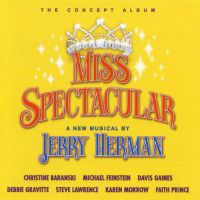 Studio Cast, 2002 (DRG)
Studio Cast, 2002 (DRG)  (4 / 5) A planned 2001 production of Jerry Herman’s Miss Spectacular in Las Vegas never materialized, but this concept recording is a doozy, featuring the kind of cast that any theatrical producer would have had to empty his and many others’ wallets to sign. Performing at their best are Debbie Gravitte, Michael Feinstein, Faith Prince, Christine Baranski, Karen Morrow, Davis Gaines, and Steve Lawrence; the last-named singer robustly delivers a paean to Las Vegas that cutely includes the names “Steve and Eydie.” The plot of the musical concerns Kansas expatriate Sarah Jane Hotchkiss, who has come to Vegas to enter a competition to be chosen as spokeswoman for the Spectacular Hotel, all the while remaining emotionally tied to the boy back home. Herman’s songs are on a par with the composer-lyricist’s best work. Not only is there a banjo-heavy anthem called “Sarah Jane” to rank with the title songs “Hello, Dolly!” and “Mame,” there’s also a love song, “No Other Music,” that’s one of Herman’s finest ballads; happily, it gets a perfect reading by the great Morrow. Feinstein beautifully delivers the lush “Ziegfeld Girl,” a tribute to showgirl pulchritude. An 18-member chorus and a large orchestra are conducted by the redoubtable veteran Donald Pippin, who also did the vocal arrangements; Larry Blank provided the string-and brass-prominent orchestrations. The plot of Miss Spectacular isn’t a world-beater, so this recording may well turn out to be the best-ever realization of the piece. — David Finkle
(4 / 5) A planned 2001 production of Jerry Herman’s Miss Spectacular in Las Vegas never materialized, but this concept recording is a doozy, featuring the kind of cast that any theatrical producer would have had to empty his and many others’ wallets to sign. Performing at their best are Debbie Gravitte, Michael Feinstein, Faith Prince, Christine Baranski, Karen Morrow, Davis Gaines, and Steve Lawrence; the last-named singer robustly delivers a paean to Las Vegas that cutely includes the names “Steve and Eydie.” The plot of the musical concerns Kansas expatriate Sarah Jane Hotchkiss, who has come to Vegas to enter a competition to be chosen as spokeswoman for the Spectacular Hotel, all the while remaining emotionally tied to the boy back home. Herman’s songs are on a par with the composer-lyricist’s best work. Not only is there a banjo-heavy anthem called “Sarah Jane” to rank with the title songs “Hello, Dolly!” and “Mame,” there’s also a love song, “No Other Music,” that’s one of Herman’s finest ballads; happily, it gets a perfect reading by the great Morrow. Feinstein beautifully delivers the lush “Ziegfeld Girl,” a tribute to showgirl pulchritude. An 18-member chorus and a large orchestra are conducted by the redoubtable veteran Donald Pippin, who also did the vocal arrangements; Larry Blank provided the string-and brass-prominent orchestrations. The plot of Miss Spectacular isn’t a world-beater, so this recording may well turn out to be the best-ever realization of the piece. — David Finkle
Miss Saigon
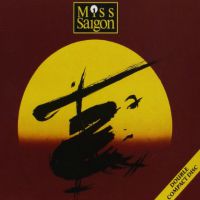 Original London Cast, 1989 (Geffen, 2CDs) No stars; not recommended. As was the case with The Phantom of the Opera and Les Misérables, its equally lamentable predecessors, Miss Saigon was brought into the world by people who followed a crooked path to enormous popular and financial (but not artistic) success: Create a poorly written stage musical based on a story that has been beloved for generations and, with the help of shrewd marketing, it will run for years even if the adaptation is third-rate, or worse. The plot of Miss Saigon is based on that of the Puccini opera Madama Butterfly and its antecedents, with the action reset to the era of the Vietnam War. But the Claude-Michel Schönberg-Alain Boublil show built around that intriguing concept has one of the most impoverished scores ever contrived for the musical theater, including some dicey borrowings from the works of other composers; for instance, “Why, God, Why?” begins with a beautiful tune that was originally written by Richard Rodgers for “There’s a Small Hotel” in On Your Toes. The Francophone librettist Boublil’s collaboration with Richard Maltby, Jr. yielded lyrics that are awkwardly phrased to the point of semi-literacy. (A few examples among dozens: “God, the tension is high, not to mention the smell,” “My parents got themselves killed in the week you changed sides,” and “You must decide upon which side you’re really on.” ) The song “Movie in My Mind” illustrates the chasm between the creators’ goals and their abilities: The idea of the Vietnamese prostitutes imagining an alternate reality in order to bear the selling of their bodies is interesting, but the music and lyrics are utterly pedestrian. Although it’s difficult to identify the nadir of the score, one good candidate is “Bui Doi,” a shamelessly manipulative plea on behalf of children sired by American servicemen and left behind in Vietnam; experiencing Miss Saigon via audio recording at least spares one having to view the tasteless film that was projected onstage during this sequence. Listeners are also spared the spectacle of the completely Caucasian-looking and British-sounding Jonathan Pryce in the role of the Engineer, a reprehensible Eurasian pimp, but Pryce is badly miscast even from an aural standpoint. On the plus side, Lea Salonga sounds lovely and winsome as Kim. Simon Bowman as her lover, Chris, sings well but doesn’t sound American, which is a problem in terms of the plot. — Michael Portantiere
Original London Cast, 1989 (Geffen, 2CDs) No stars; not recommended. As was the case with The Phantom of the Opera and Les Misérables, its equally lamentable predecessors, Miss Saigon was brought into the world by people who followed a crooked path to enormous popular and financial (but not artistic) success: Create a poorly written stage musical based on a story that has been beloved for generations and, with the help of shrewd marketing, it will run for years even if the adaptation is third-rate, or worse. The plot of Miss Saigon is based on that of the Puccini opera Madama Butterfly and its antecedents, with the action reset to the era of the Vietnam War. But the Claude-Michel Schönberg-Alain Boublil show built around that intriguing concept has one of the most impoverished scores ever contrived for the musical theater, including some dicey borrowings from the works of other composers; for instance, “Why, God, Why?” begins with a beautiful tune that was originally written by Richard Rodgers for “There’s a Small Hotel” in On Your Toes. The Francophone librettist Boublil’s collaboration with Richard Maltby, Jr. yielded lyrics that are awkwardly phrased to the point of semi-literacy. (A few examples among dozens: “God, the tension is high, not to mention the smell,” “My parents got themselves killed in the week you changed sides,” and “You must decide upon which side you’re really on.” ) The song “Movie in My Mind” illustrates the chasm between the creators’ goals and their abilities: The idea of the Vietnamese prostitutes imagining an alternate reality in order to bear the selling of their bodies is interesting, but the music and lyrics are utterly pedestrian. Although it’s difficult to identify the nadir of the score, one good candidate is “Bui Doi,” a shamelessly manipulative plea on behalf of children sired by American servicemen and left behind in Vietnam; experiencing Miss Saigon via audio recording at least spares one having to view the tasteless film that was projected onstage during this sequence. Listeners are also spared the spectacle of the completely Caucasian-looking and British-sounding Jonathan Pryce in the role of the Engineer, a reprehensible Eurasian pimp, but Pryce is badly miscast even from an aural standpoint. On the plus side, Lea Salonga sounds lovely and winsome as Kim. Simon Bowman as her lover, Chris, sings well but doesn’t sound American, which is a problem in terms of the plot. — Michael Portantiere
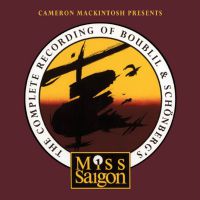 Studio Cast, 1995 (Angel, 2CDs) No stars; not recommended. The CD booklet notes assure us that there was much more to the success of Miss Saigon than the stunning onstage simulation of the landing and takeoff of a helicopter. Yet this recording begins with the whirring of chopper blades, as if to admit: “Yes, that special effect is what most people will remember about the show.” Billed as a “complete recording,” it includes revisions of the score that were made following the London production. The cast, drawn from several of the show’s worldwide productions, is backed by a huge orchestra. Joanna Ampil’s Kim is very much in the Lea Salonga mold, which is a good thing. The partly Asian Kevin Gray brings credibility to the role of the Engineer, but even he can’t triumph over such dreck as “The American Dream,” a hit-them-over-the-head number in which the title phrase is repeated 18 times. Like his recorded predecessor in the role of Chris, Peter Cousens, from the Sydney company, has a fine voice but is unable to sound convincingly American. Hinton Battle sings John’s “Bui Doi” for all it’s worth, which is very little, and the thankless role of Ellen is well handled by Ruthie Henshall. The orchestra, conducted by David Charles Abell, plays beautifully, and the sound quality of the recording is superb, but it’s all in service of a score that, unsurprisingly, seems to have had no staying power whatsoever outside of the show itself. — M.P.
Studio Cast, 1995 (Angel, 2CDs) No stars; not recommended. The CD booklet notes assure us that there was much more to the success of Miss Saigon than the stunning onstage simulation of the landing and takeoff of a helicopter. Yet this recording begins with the whirring of chopper blades, as if to admit: “Yes, that special effect is what most people will remember about the show.” Billed as a “complete recording,” it includes revisions of the score that were made following the London production. The cast, drawn from several of the show’s worldwide productions, is backed by a huge orchestra. Joanna Ampil’s Kim is very much in the Lea Salonga mold, which is a good thing. The partly Asian Kevin Gray brings credibility to the role of the Engineer, but even he can’t triumph over such dreck as “The American Dream,” a hit-them-over-the-head number in which the title phrase is repeated 18 times. Like his recorded predecessor in the role of Chris, Peter Cousens, from the Sydney company, has a fine voice but is unable to sound convincingly American. Hinton Battle sings John’s “Bui Doi” for all it’s worth, which is very little, and the thankless role of Ellen is well handled by Ruthie Henshall. The orchestra, conducted by David Charles Abell, plays beautifully, and the sound quality of the recording is superb, but it’s all in service of a score that, unsurprisingly, seems to have had no staying power whatsoever outside of the show itself. — M.P.
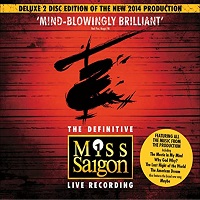 London Cast, 2014 (Verve, 2CDs) No stars; not recommended. Can the phrase “diminishing returns” be applied to the third cast album of a show when its score has so little worth to begin with? This is arrogantly billed as the “definitive recording” of Miss Saigon, and it’s probably best to leave it to fans of the show to decide whether or not they agree with that assessment. Many of the lyrics were rewritten for this 25th anniversary production, but not necessarily for the better. Some of the new lyrics do improve at least somewhat on the horrendous grammar of the originals, but the main impetus for the rewrites seems to have been to make the show more graphic in terms of sex and grit — so much so that this live recording bears an “explicit lyrics” warning. (Example, “If I’m your pin-up, I’ll melt all your brass, stuck on your ball with a pin in my ass.” Seriously.) As for the cast, Jon Jon Briones is an appropriately oily Engineer; Eva Noblezada’s voice is capable of sweetness and power as necessary in the role of Kim; and Alistair Brammer has a lovely, lyrical tenor, plus he’s the only recorded Chris who sounds convincingly American rather than British. (Note: After its run at the Prince Edward Theatre in London, this production transferred to Broadway, and Briones won a Tony Award for his performance. A high quality video of the production, captured in London, is also available for those who have any interest in such an item.) — M.P.
London Cast, 2014 (Verve, 2CDs) No stars; not recommended. Can the phrase “diminishing returns” be applied to the third cast album of a show when its score has so little worth to begin with? This is arrogantly billed as the “definitive recording” of Miss Saigon, and it’s probably best to leave it to fans of the show to decide whether or not they agree with that assessment. Many of the lyrics were rewritten for this 25th anniversary production, but not necessarily for the better. Some of the new lyrics do improve at least somewhat on the horrendous grammar of the originals, but the main impetus for the rewrites seems to have been to make the show more graphic in terms of sex and grit — so much so that this live recording bears an “explicit lyrics” warning. (Example, “If I’m your pin-up, I’ll melt all your brass, stuck on your ball with a pin in my ass.” Seriously.) As for the cast, Jon Jon Briones is an appropriately oily Engineer; Eva Noblezada’s voice is capable of sweetness and power as necessary in the role of Kim; and Alistair Brammer has a lovely, lyrical tenor, plus he’s the only recorded Chris who sounds convincingly American rather than British. (Note: After its run at the Prince Edward Theatre in London, this production transferred to Broadway, and Briones won a Tony Award for his performance. A high quality video of the production, captured in London, is also available for those who have any interest in such an item.) — M.P.
Miss Liberty
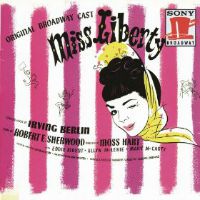 Original Broadway Cast, 1949 (Columbia/Sony)
Original Broadway Cast, 1949 (Columbia/Sony)  (2 / 5) Irving Berlin’s highly anticipated follow-up to Annie Get Your Gun was one of those can’t-miss packages that missed. It had thick postwar nostalgia, Jerome Robbins choreography, direction by Moss Hart, sets by Oliver Smith, and a book by the distinguished playwright Robert E. Sherwood. The plot is slight: Reporter travels to 1885 Paris to interview Bartholdi’s model for the Statue of Liberty, bags the wrong girl, and hilarious complications ensue. Apparently, one of the show’s problems was that audiences rooted for the reporter to end up with his American girlfriend, not the jeune fllle who ultimately lands him. But the real trouble may have been the unexciting principals and Berlin’s lackluster score. Eddie Albert, a Broadway pro by 1949, was capable but hardly one to set a stage ablaze. The girls fighting for his affections, Allyn Ann McLerie and Mary McCarty, were promising young talents, the former more a dancer than a singer (Exhibit A: her high notes in “Just One Way to Say I Love You”) and the latter an ideal best-pal sort overselling middling material. Berlin packs some good foreign-relations jabs into “Only for Americans,” and the show’s finale, “Give Me Your Tired, Your Poor,” has the required dignity, although McLerie’s thin soprano undercuts it somewhat. Otherwise, the album is interesting as a document of how deeply ingrained sexism was in 1949. In “Homework,” career gal McCarty admits that her real dream is “Staying / At home and crocheting / And meekly obeying / The guy who comes home.” In “You Can Have Him,” she says that her greatest desire is to “give him babies, one for every year.” Sheesh! — Marc Miller
(2 / 5) Irving Berlin’s highly anticipated follow-up to Annie Get Your Gun was one of those can’t-miss packages that missed. It had thick postwar nostalgia, Jerome Robbins choreography, direction by Moss Hart, sets by Oliver Smith, and a book by the distinguished playwright Robert E. Sherwood. The plot is slight: Reporter travels to 1885 Paris to interview Bartholdi’s model for the Statue of Liberty, bags the wrong girl, and hilarious complications ensue. Apparently, one of the show’s problems was that audiences rooted for the reporter to end up with his American girlfriend, not the jeune fllle who ultimately lands him. But the real trouble may have been the unexciting principals and Berlin’s lackluster score. Eddie Albert, a Broadway pro by 1949, was capable but hardly one to set a stage ablaze. The girls fighting for his affections, Allyn Ann McLerie and Mary McCarty, were promising young talents, the former more a dancer than a singer (Exhibit A: her high notes in “Just One Way to Say I Love You”) and the latter an ideal best-pal sort overselling middling material. Berlin packs some good foreign-relations jabs into “Only for Americans,” and the show’s finale, “Give Me Your Tired, Your Poor,” has the required dignity, although McLerie’s thin soprano undercuts it somewhat. Otherwise, the album is interesting as a document of how deeply ingrained sexism was in 1949. In “Homework,” career gal McCarty admits that her real dream is “Staying / At home and crocheting / And meekly obeying / The guy who comes home.” In “You Can Have Him,” she says that her greatest desire is to “give him babies, one for every year.” Sheesh! — Marc Miller
Minnie’s Boys
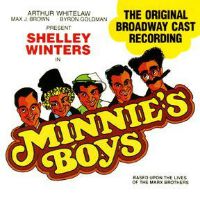 Original Broadway Cast, 1970 (Project 3)
Original Broadway Cast, 1970 (Project 3)  (2 / 5) “Good MORN-ing, ladies!!” Shelley Winters’ entrance line in this musical biography of the Marx Brothers and their indomitable mother is brayed rather than spoken, and most of her subsequent readings on this shrill cast album are snorted rather than sung. Winters had sung before –she was a replacement Ado Annie in the original Oklahoma! — but she’s hoarse here, and more pushy than the role requires. The part, a Mama Rose lite without subtext or character growth, ultimately defeats the star. Other components of this Larry Grossman-Hal Hackady work, their first for Broadway aside from a couple of revue songs, are tuneful if frequently mired in showbiz cliché: Harpo’s (Daniel Fortus’s) love ballad to his mother, “Mama, a Rainbow”; a wry brothers’ lament, “Where Was I When They Passed Out Luck?”; and father Frenchie’s (Arny Freeman’s) torch song “Empty,” cut before opening night but included here. A duet between Lewis J. Stadlen as Groucho and Julie Kurnitz as a Margaret Dumont type is glorious, and an ambitious finale depicting the progression of the brothers’ characters gets an “A” for effort. But the score lacks a certain something, and it’s not well supported by garish orchestrations that are, shockingly, the work of the great Ralph Burns. — Marc Miller
(2 / 5) “Good MORN-ing, ladies!!” Shelley Winters’ entrance line in this musical biography of the Marx Brothers and their indomitable mother is brayed rather than spoken, and most of her subsequent readings on this shrill cast album are snorted rather than sung. Winters had sung before –she was a replacement Ado Annie in the original Oklahoma! — but she’s hoarse here, and more pushy than the role requires. The part, a Mama Rose lite without subtext or character growth, ultimately defeats the star. Other components of this Larry Grossman-Hal Hackady work, their first for Broadway aside from a couple of revue songs, are tuneful if frequently mired in showbiz cliché: Harpo’s (Daniel Fortus’s) love ballad to his mother, “Mama, a Rainbow”; a wry brothers’ lament, “Where Was I When They Passed Out Luck?”; and father Frenchie’s (Arny Freeman’s) torch song “Empty,” cut before opening night but included here. A duet between Lewis J. Stadlen as Groucho and Julie Kurnitz as a Margaret Dumont type is glorious, and an ambitious finale depicting the progression of the brothers’ characters gets an “A” for effort. But the score lacks a certain something, and it’s not well supported by garish orchestrations that are, shockingly, the work of the great Ralph Burns. — Marc Miller
Milk and Honey
 Original Broadway Cast, 1961 (RCA)
Original Broadway Cast, 1961 (RCA)  (3 / 5) Jerry Herman’s first Broadway score is surely one of his best, an atmosphere-soaked tour through contemporary Israel in service of a tired soap opera plot. At age 30, Herman was already a melody master. Note his gift for well-judged production numbers (the minor/major-key intricacies of “Independence Day Hora”), stirring title songs (dancer-singer Tommy Rall delivers this one with vigor), 11-o’clock showstoppers (“Hymn to Hymie,” with Molly Picon socking across a funny lyric), and warmly appealing ballads (the ardent, chromatic “There’s No Reason in the World”). The orchestrations, by Eddie Sauter and Hershy Kay, are more interesting than those that Herman’s scores generally commanded — even his bigger hits. Robert Weede, fresh from The Most Happy Fella, could still play an aging romantic lead with the best of them. Unfortunately, this time he has less to play off of; leading lady Mimi Benzell is vocally precise but terminally dull, and she doesn’t let her hair down even when the lyrics demand it. The whole album feels a little hurried, incomplete, and short on dance interludes. But Herman comes out swinging: The opening number, “Shalom,” announces an extremely promising Broadway songwriter. That was this score’s hit song, but there’s plenty more to appreciate here. — Marc Miller
(3 / 5) Jerry Herman’s first Broadway score is surely one of his best, an atmosphere-soaked tour through contemporary Israel in service of a tired soap opera plot. At age 30, Herman was already a melody master. Note his gift for well-judged production numbers (the minor/major-key intricacies of “Independence Day Hora”), stirring title songs (dancer-singer Tommy Rall delivers this one with vigor), 11-o’clock showstoppers (“Hymn to Hymie,” with Molly Picon socking across a funny lyric), and warmly appealing ballads (the ardent, chromatic “There’s No Reason in the World”). The orchestrations, by Eddie Sauter and Hershy Kay, are more interesting than those that Herman’s scores generally commanded — even his bigger hits. Robert Weede, fresh from The Most Happy Fella, could still play an aging romantic lead with the best of them. Unfortunately, this time he has less to play off of; leading lady Mimi Benzell is vocally precise but terminally dull, and she doesn’t let her hair down even when the lyrics demand it. The whole album feels a little hurried, incomplete, and short on dance interludes. But Herman comes out swinging: The opening number, “Shalom,” announces an extremely promising Broadway songwriter. That was this score’s hit song, but there’s plenty more to appreciate here. — Marc Miller
Mexican Hayride
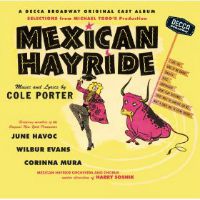 Original Broadway Cast, 1944 (Decca)
Original Broadway Cast, 1944 (Decca)  (3 / 5) Cole Porter, Herbert Fields, and Dorothy Fields enjoyed a long run with this silly piece of wartime escapism, but the major force behind the show was producer Mike Todd. First, he saturated the stage with showgirls. Then he got Porter to write a song about them for the stolid baritone Wilbur Evans to sing — “Girls (to the Right of Me, Girls to the Left of Me)” — while the chorines wiggled and shrieked around him. Disappointingly, the show’s star, the great comic Bobby Clark, is absent from this 21-minute cast album. The lead female comic, June Havoc, plays a lady bullfighter and gets to wail Porter’s “Count Your Blessings” (about the advantages of death), “There Must Be Someone for Me” (a Porter list song), and “Abracadabra.” Like so many 1940s comediennes, Havoc sounds hoydenish and too pleased with herself, bur such was the style. Evans drones the hit ballad “I Love You” without inflection, but the chorus scampers through “What a Crazy Way to Spend Sunday,” and Corinna Mura hits stratospheric notes with ease in “Sing to Me, Guitar” and “Carlotta.” While none of the material is classic, Decca’s recording of highlights conveys the incidental charms of a loud, throw-it-in-if-it-works, wartime success. As musical theater, it’s forgettable; as a crash course in tired-businessman entertainment of the period, it’s peachy. — Marc Miller
(3 / 5) Cole Porter, Herbert Fields, and Dorothy Fields enjoyed a long run with this silly piece of wartime escapism, but the major force behind the show was producer Mike Todd. First, he saturated the stage with showgirls. Then he got Porter to write a song about them for the stolid baritone Wilbur Evans to sing — “Girls (to the Right of Me, Girls to the Left of Me)” — while the chorines wiggled and shrieked around him. Disappointingly, the show’s star, the great comic Bobby Clark, is absent from this 21-minute cast album. The lead female comic, June Havoc, plays a lady bullfighter and gets to wail Porter’s “Count Your Blessings” (about the advantages of death), “There Must Be Someone for Me” (a Porter list song), and “Abracadabra.” Like so many 1940s comediennes, Havoc sounds hoydenish and too pleased with herself, bur such was the style. Evans drones the hit ballad “I Love You” without inflection, but the chorus scampers through “What a Crazy Way to Spend Sunday,” and Corinna Mura hits stratospheric notes with ease in “Sing to Me, Guitar” and “Carlotta.” While none of the material is classic, Decca’s recording of highlights conveys the incidental charms of a loud, throw-it-in-if-it-works, wartime success. As musical theater, it’s forgettable; as a crash course in tired-businessman entertainment of the period, it’s peachy. — Marc Miller
Merrily We Roll Along
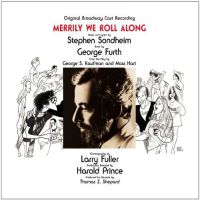 Original Broadway Cast, 1981 (RCA)
Original Broadway Cast, 1981 (RCA)  (5 / 5) A big flop in its original Broadway production, this show boasts one of Stephen Sondheim’s best scores. George Furth’s book, based on a George S. Kaufman-Moss Hart disappointment, follows three erstwhile best friends — a composer-turned-producer, his former lyricist partner, and an author/journalist — backward in time from adulthood to their idealistic salad days in New York, reviewing the missteps, betrayals, and compromises made along the way. With its lurid “inside” view of showbiz, the musical was dramatically unworkable. Also, the production design was disastrous; and the performers, playing gin-swilling, backstabbing sophisticates through most of the show, were too young. But none of this matters when you’re listening to the recording. Savor the heartbreaking melodies and trenchant lyrics, or analyze the score’s jigsaw-puzzle construction in which themes and ideas are set forth, then quoted and reworked, creating a solid emotional substructure. (The melody that’s first heard as “The Hills of Tomorrow” is reused several times and serves as a strong musical through-line.) Jonathan Tunick’s orchestrations are brassy and driving, and the three leads are marvelous. As composer Franklin Shepard, Jim Walton displays a piercing tenor that shines especially in “Not a Day Goes By,” one of Sondheim’s most wounding ballads. Lonny Price is appealing as Charley, Frank’s collaborator; he easily navigates the tortuous lyrics of “Franklin Shepard, Inc.” and gives a heartfelt reading of the rueful “Good Thing Going.” Another plus is a young Jason Alexander as Joe. But the big revelation is Ann Morrison, devastating as Mary, the writer who descends into alcoholism while pining for Frank. She brings an overwhelming warmth and sadness to “Like It Was” and “Not a Day Goes By,” and is just as strong in the invigorating “Now You Know.” — David Barbour
(5 / 5) A big flop in its original Broadway production, this show boasts one of Stephen Sondheim’s best scores. George Furth’s book, based on a George S. Kaufman-Moss Hart disappointment, follows three erstwhile best friends — a composer-turned-producer, his former lyricist partner, and an author/journalist — backward in time from adulthood to their idealistic salad days in New York, reviewing the missteps, betrayals, and compromises made along the way. With its lurid “inside” view of showbiz, the musical was dramatically unworkable. Also, the production design was disastrous; and the performers, playing gin-swilling, backstabbing sophisticates through most of the show, were too young. But none of this matters when you’re listening to the recording. Savor the heartbreaking melodies and trenchant lyrics, or analyze the score’s jigsaw-puzzle construction in which themes and ideas are set forth, then quoted and reworked, creating a solid emotional substructure. (The melody that’s first heard as “The Hills of Tomorrow” is reused several times and serves as a strong musical through-line.) Jonathan Tunick’s orchestrations are brassy and driving, and the three leads are marvelous. As composer Franklin Shepard, Jim Walton displays a piercing tenor that shines especially in “Not a Day Goes By,” one of Sondheim’s most wounding ballads. Lonny Price is appealing as Charley, Frank’s collaborator; he easily navigates the tortuous lyrics of “Franklin Shepard, Inc.” and gives a heartfelt reading of the rueful “Good Thing Going.” Another plus is a young Jason Alexander as Joe. But the big revelation is Ann Morrison, devastating as Mary, the writer who descends into alcoholism while pining for Frank. She brings an overwhelming warmth and sadness to “Like It Was” and “Not a Day Goes By,” and is just as strong in the invigorating “Now You Know.” — David Barbour
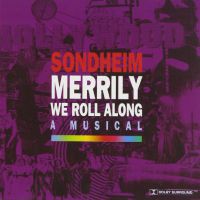 Leicester Haymarket Theatre Cast, 1993 (JAY, 2CDs)
Leicester Haymarket Theatre Cast, 1993 (JAY, 2CDs)  (4 / 5) This is a recording of a heavily revised version of Merrily We Roll Along, with substantial dialogue sequences included. The story line is still plagued by a breathless view of showbiz mores, and the idea that writing Broadway musicals is a career for noble souls while working on Hollywood films is iniquitous. New material includes “That Frank,” a reworking of “Rich and Happy”; “Growing Up,” sung by Frank and his second wife, Gussie; and the entr’acte, bows, and exit music. Also included is a song that was cut from the original production: “The Blob,” Gussie’s disenchanted description of the guests at her New York party. This lively, up-tempo performance has strong work from its mostly British cast, especially Michael Cantwell as Frank and Jacqueline Dankworth as Beth, Frank’s first wife. Maria Friedman strains for brittle sophistication as Mary, but she partners nicely with Dankworth and Cantwell in “Not a Day Goes By.” American performer Evan Pappas is a very capable Charley, especially in “Good Thing Going.” Louise Gold is an aptly cynical Gussie. Minor flaws include some shaky American accents and occasionally over-emphatic performances, but it’s interesting to hear the score performed by an adult cast. — D.B.
(4 / 5) This is a recording of a heavily revised version of Merrily We Roll Along, with substantial dialogue sequences included. The story line is still plagued by a breathless view of showbiz mores, and the idea that writing Broadway musicals is a career for noble souls while working on Hollywood films is iniquitous. New material includes “That Frank,” a reworking of “Rich and Happy”; “Growing Up,” sung by Frank and his second wife, Gussie; and the entr’acte, bows, and exit music. Also included is a song that was cut from the original production: “The Blob,” Gussie’s disenchanted description of the guests at her New York party. This lively, up-tempo performance has strong work from its mostly British cast, especially Michael Cantwell as Frank and Jacqueline Dankworth as Beth, Frank’s first wife. Maria Friedman strains for brittle sophistication as Mary, but she partners nicely with Dankworth and Cantwell in “Not a Day Goes By.” American performer Evan Pappas is a very capable Charley, especially in “Good Thing Going.” Louise Gold is an aptly cynical Gussie. Minor flaws include some shaky American accents and occasionally over-emphatic performances, but it’s interesting to hear the score performed by an adult cast. — D.B.
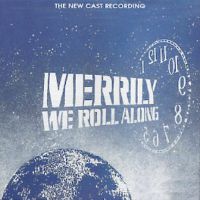 Off-Broadway Cast, 1994 (Varèse Sarabande)
Off-Broadway Cast, 1994 (Varèse Sarabande)  (4 / 5) The York Theatre production of Merrily We Roll Along is preserved on this recording, which presents a slightly condensed version of the material heard on the Leicester Haymarket album and has a slight edge over that version because it boasts superb singing and warmer performances overall. Malcolm Gets and Adam Heller are in fine form as Frank and Charley. Amy Ryder is quite wonderful as tough-talking, heartbroken Mary. Michele Pawk is a gutsy Gussie (her brassy rendition of “Good Thing Going” is a riot), and Anne Bobby is the most touching Beth on record, especially in “Not a Day Goes By.” Jonathan Tunick’s new orchestrations, for far fewer instruments than the Broadway production boasted, work quite well, giving the entire performance energy and bite. A particular standout is “Opening Doors,” one of Sondheim’s most dazzling numbers, in an extended sequence that shows us Frank, Charley, and Mary at the beginning of their careers. — D.B.
(4 / 5) The York Theatre production of Merrily We Roll Along is preserved on this recording, which presents a slightly condensed version of the material heard on the Leicester Haymarket album and has a slight edge over that version because it boasts superb singing and warmer performances overall. Malcolm Gets and Adam Heller are in fine form as Frank and Charley. Amy Ryder is quite wonderful as tough-talking, heartbroken Mary. Michele Pawk is a gutsy Gussie (her brassy rendition of “Good Thing Going” is a riot), and Anne Bobby is the most touching Beth on record, especially in “Not a Day Goes By.” Jonathan Tunick’s new orchestrations, for far fewer instruments than the Broadway production boasted, work quite well, giving the entire performance energy and bite. A particular standout is “Opening Doors,” one of Sondheim’s most dazzling numbers, in an extended sequence that shows us Frank, Charley, and Mary at the beginning of their careers. — D.B.
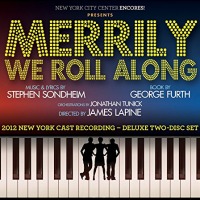 New York City Center Encores! Cast, 2012 (PS Classics)
New York City Center Encores! Cast, 2012 (PS Classics)  (2 / 5) The much-anticipated Encores! concert staging of Merrily We Roll Along proved to be oddly listless, and so is this recording. The casting is partly to blame. Colin Donnell’s Frank is so bland and forgettable that at times he seems to disappear from the show. Lin-Manuel Miranda is strictly pro-forma as Charley, lacking the fury (and the vocal ability) that Lonny Price brought to the role. Celia Keenan-Bolger struggles to effectively deliver Mary’s acid-laced wisecracks — e.g., PARTY GUEST: “I wrote the screenplay for Frank’s movie.” MARY: “Your secret is safe with me.” Also, during the reprise of “Not a Day Goes By,” one misses the effortless heartbreak that Ann Morrison brought to the number. Thanks to slower tempi and a general lack of urgency, one begins to notice that the song “That Frank” is inferior to the one it replaced, “Rich and Happy,” and that “Growing Up” and “The Blob” are among the weaker numbers in Sondheim’s songbook. Adam Grupper and Elizabeth Stanley are fine as Joe and Gussie, with Betsy Wolfe the standout as Beth. Completists will want this recording, especially given the personnel involved, but any of its predecessors makes a better case for this famously troubled, heartbreaking show. — D.B.
(2 / 5) The much-anticipated Encores! concert staging of Merrily We Roll Along proved to be oddly listless, and so is this recording. The casting is partly to blame. Colin Donnell’s Frank is so bland and forgettable that at times he seems to disappear from the show. Lin-Manuel Miranda is strictly pro-forma as Charley, lacking the fury (and the vocal ability) that Lonny Price brought to the role. Celia Keenan-Bolger struggles to effectively deliver Mary’s acid-laced wisecracks — e.g., PARTY GUEST: “I wrote the screenplay for Frank’s movie.” MARY: “Your secret is safe with me.” Also, during the reprise of “Not a Day Goes By,” one misses the effortless heartbreak that Ann Morrison brought to the number. Thanks to slower tempi and a general lack of urgency, one begins to notice that the song “That Frank” is inferior to the one it replaced, “Rich and Happy,” and that “Growing Up” and “The Blob” are among the weaker numbers in Sondheim’s songbook. Adam Grupper and Elizabeth Stanley are fine as Joe and Gussie, with Betsy Wolfe the standout as Beth. Completists will want this recording, especially given the personnel involved, but any of its predecessors makes a better case for this famously troubled, heartbreaking show. — D.B.
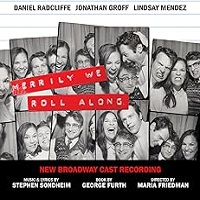 Broadway Cast, 2023 (Masterworks Broadway)
Broadway Cast, 2023 (Masterworks Broadway)  (4 / 5) Endlessly fussed over but arguably never improved since its original production, Merrily We Roll Along finally achieved smash-hit status via Maria Friedman’s 2023 Broadway revival, which yielded this cast album. With Sondheim’s passing in 2021, and with the original score and script unavailable for production, this is presumably the final, standard version—alas. Dropping the framing device of two high school graduations has meant losing “The Hills of Tomorrow,” the score’s Rosetta Stone and the key to its many musical inventions. The title song, originally sung by the young cast members rebelling against the middle-aged Frank’s commencement speech, makes an enervated stand-alone opening number that, rather than building, merely repeats itself. “Growing Up,” designed to showcase the expanded role of Gussie — now a grasping, man-eating Broadway star who swallows Frank whole — is a low-energy pill inserted once into each act, its lyrics only adding to the show’s oversupply of editorializing. And yet: The crisp, staccato rendering of the overture pulses with excitement, and the three leads are sensational throughout. “That Frank” plays better than usual, thanks to the tense back-and-forth between Jonathan Groff’s Frank and Lindsay Mendez’s Mary. Mendez brings an autumnal regret to “Like It Was” and “Not a Day Goes By.” Daniel Radcliffe’s intelligent, furiously intense “Franklin Shepard, Inc.” may be the best since Lonny Price’s. All three stars display combustible chemistry in “Old Friends” and, in “Opening Doors,” their mutual affection feels natural and unforced. Katie Rose Clarke brings an interesting sense of grievance to “Not a Day Goes By.” Though Radcliffe will never be primarily known as a singer, his performance of “Good Thing Going” has a touching sensitivity that contrasts effectively with the blowsy, brassy rendition of Kristal Joy Browne as Gussie, exposing how Frank and Charley’s work has been vulgarized for Broadway. Merrily continues to be the ultimate heartbreaker, an unfixable show with a superb score, and an endless source of argumentation among fans. If you own the original recording and this one, you have a clear picture of what happened to it on its long, slow journey to box office success. — D.B.
(4 / 5) Endlessly fussed over but arguably never improved since its original production, Merrily We Roll Along finally achieved smash-hit status via Maria Friedman’s 2023 Broadway revival, which yielded this cast album. With Sondheim’s passing in 2021, and with the original score and script unavailable for production, this is presumably the final, standard version—alas. Dropping the framing device of two high school graduations has meant losing “The Hills of Tomorrow,” the score’s Rosetta Stone and the key to its many musical inventions. The title song, originally sung by the young cast members rebelling against the middle-aged Frank’s commencement speech, makes an enervated stand-alone opening number that, rather than building, merely repeats itself. “Growing Up,” designed to showcase the expanded role of Gussie — now a grasping, man-eating Broadway star who swallows Frank whole — is a low-energy pill inserted once into each act, its lyrics only adding to the show’s oversupply of editorializing. And yet: The crisp, staccato rendering of the overture pulses with excitement, and the three leads are sensational throughout. “That Frank” plays better than usual, thanks to the tense back-and-forth between Jonathan Groff’s Frank and Lindsay Mendez’s Mary. Mendez brings an autumnal regret to “Like It Was” and “Not a Day Goes By.” Daniel Radcliffe’s intelligent, furiously intense “Franklin Shepard, Inc.” may be the best since Lonny Price’s. All three stars display combustible chemistry in “Old Friends” and, in “Opening Doors,” their mutual affection feels natural and unforced. Katie Rose Clarke brings an interesting sense of grievance to “Not a Day Goes By.” Though Radcliffe will never be primarily known as a singer, his performance of “Good Thing Going” has a touching sensitivity that contrasts effectively with the blowsy, brassy rendition of Kristal Joy Browne as Gussie, exposing how Frank and Charley’s work has been vulgarized for Broadway. Merrily continues to be the ultimate heartbreaker, an unfixable show with a superb score, and an endless source of argumentation among fans. If you own the original recording and this one, you have a clear picture of what happened to it on its long, slow journey to box office success. — D.B.
The Me Nobody Knows
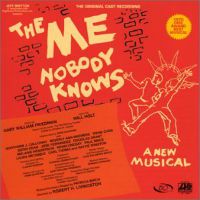 Original Broadway Cast, 1970 (Atlantic/150 Music)
Original Broadway Cast, 1970 (Atlantic/150 Music)  (3 / 5) Based on Stephen M. Joseph’s book of the same title, The Me Nobody Knows is a collection of writings by inner-city students turned into a musical by composer Gary William Friedman, lyricist Will Holt, and playwright Herb Schapiro. Holt did his best to create lyrics without making big alterations to the material; the result is a collection of poetic songs that describe the dreams of kids growing up in the ghetto. With their defiantly hopeful voices, the show’s energetic company of 12 brings truth to songs like “If I Had a Million Dollars,” “How I Feel,” and “Black.” The cast album was belatedly released on CD; the sound quality isn’t very clean, and some of the kids’ voices are pretty rough. Still, these elements give The Me Nobody Knows an authentic feeling of time and place, while the material itself — concerning drugs, poverty, and other challenges faced by this population — is still sadly relevant. Even those who don’t appreciate the funky rock score will likely be moved by the infectious melody and imagery of “Light Sings” or the musical’s beautiful finale, “Let Me Come In.” — Brooke Pierce
(3 / 5) Based on Stephen M. Joseph’s book of the same title, The Me Nobody Knows is a collection of writings by inner-city students turned into a musical by composer Gary William Friedman, lyricist Will Holt, and playwright Herb Schapiro. Holt did his best to create lyrics without making big alterations to the material; the result is a collection of poetic songs that describe the dreams of kids growing up in the ghetto. With their defiantly hopeful voices, the show’s energetic company of 12 brings truth to songs like “If I Had a Million Dollars,” “How I Feel,” and “Black.” The cast album was belatedly released on CD; the sound quality isn’t very clean, and some of the kids’ voices are pretty rough. Still, these elements give The Me Nobody Knows an authentic feeling of time and place, while the material itself — concerning drugs, poverty, and other challenges faced by this population — is still sadly relevant. Even those who don’t appreciate the funky rock score will likely be moved by the infectious melody and imagery of “Light Sings” or the musical’s beautiful finale, “Let Me Come In.” — Brooke Pierce

